#i need both i need to be unhinged but also have meaningful discussions
Explore tagged Tumblr posts
Text
When I want to not be weird about something but I have literally never been normal about a piece of media in my life
#unhinged#me with anime#no I'm not obsessed with japan in a wierd way i just think hot men fighting eachother is neat#i need both i need to be unhinged but also have meaningful discussions#gojo is an amazing complex character AND i need him to rail me into next week#god fucking damnit autism can i not drive people away from me with my obsessions#can i just be silly about my little guys#vent post#vent#but like a little vent not a big vent#autism#actually autistic#neurodivergent#special interest#star wars#jujutsu kaisen#jjk#anime#ace attorney#demon slayer#kimetsu no yaiba#good omens#bungou stray dogs
33 notes
·
View notes
Text
WOAH i really liked this analysis!!! 0_0 It gave me so much to think about ad re-evaluate! Love it to pieces!!!!!! (IM SO SORRY i wanted this to be much shorter but got excited i guess.. a good part of this reply is a re-work of things already said in the post but hopefully i can contribute a bit to the discussion w my own thoughts/analysis T-T)
I specially liked the parts analysing the way Yuuji's strenght has warped his worldview and contributed, in conjunction with his need for human connection, to his hero's complex. And also how this hero role, this enormous task, can (and has) break people (Higuruma and Geto).
Higuruma even points out the flaw in his mindset, well if you loathe yourself for being weak, then what about other people who are weak do you loathe them too? I think it's no coincidence that Yuji is paralleled not one, but two (Geto, Higuruma) people who tried to use their strength in benevolent ways only to start out loathing the people they were trying to help. I'm not saying that Yuji secretly hates weak people, but his mindset of black and white, weak and strong, a mindset that can't accept the greys of reality is a dangerous mindset to have and Yuji has the potential to become like those two. However, these parallels exist for us the audience to see just how close Yuji was to repeating the cycle, because it makes it that much more meaningful when Yuji grows in ways that Geto and Higuruma doesn't to move one step forward towards breaking that cycle instead.
This is such a good point!! I totally agree, Yuuji's laser-focus desire of saving people is naive; frighteningly lacking in self-preservation and, since the beginning, it has deeply affected the way Yuuji interacts with other people, as well as the way he views himself. It always has.
Despite what he told Mahito about saving people “for no reason, just as Mahito kills and makes people suffer for no reason,” Yuuji's desire to help people says a lot about him on a personal level.
(I think that this is (partly) what Mahito was trying to tell him in their fight in Shibuya: that Yuujis values and actions come from who he is, from both his humanity and the peacefulness of the time/way he was raised in. That shaped him, in a way that its neither good or bad, just "natural to him". Thats why he's "just like Mahito", whose second nature as a curse is to hurt and kill people.
PS, i could be wrong? but for me curses in jjk, even if they are so "humanized" are not actually human or at least are not treated as such in the narrative. I think they most likely represent something akin to human fears or evil. After all, unlike humans, they dont really "die", they are able to come back).
Yuuji values human life to the point of putting them above his own needs, his own survival. Like any other human, he fears death, but even stronger than his instinct is his desire to save and protect in a way that a lot of times comes across as unhinged instead of noble (and yeah, the story constantly punishes him for this, one of the most recent examples being Sukuna betting on this when he decides to rip off his finger... and, sure enough, in the part of their deal that stipulated that Sukuna must not hurt anyone, Yuuji… did not include himself in it).
The thing is that... Yuuji measures the value of his own life in his ability to protect other human lives. He is only worthy and valuable when he is able to save people. It gives him a role to play, a reason to live, a way to connect with others.
BUT ALSO, this is something this post made me realize (and i feel so dumb cos the pieces were all there, i saw them but wasn't able to put them together): Yuuji sees himself as "strong" (and yeah, compared to "normal", non-sorcerers, he is) and therefore, those who are (or who he perceives as) weaker than him, he must save/protect.
Yuji in Amai Rin's flashback is beating up bullies, a heroic notion, but from the perspective of somone spineless like Amai who was just going along with the bullies so he himself wouldn't be bullied because he didn't have the strength to stand up with them, and wasn't born with the body of an MMA fighter at fifteen, Yuji looks scary. The reason why reducing people to labels like strong and weak is reductive is that humans are complex and contradictory creatures. Let's take Amai Rin for example, an incredibly minor character. In the real world, Amai Rin would be someone as equally complex as Gojo Satoru. Amai Rin a middle school bully would have just as many layers to his personality, inconsistencies, contradictory behavior, different sides of himself as Gojo Satoru himself. Humans are complex in the first place because we can't see inside their heads, we can only see inside our own heads and know that we're complex and sometimes say things we don't mean, behave differently depending on the situation, do things we're not proud of, but we also usually don't perceive others the same way because we are not inside their heads like our own. Amai Rin is just as complex and multifaceted a human being as Gojo Satoru, he is a person with his own memories and life experiences that shape him, but from Gojo's worldview Amai Rin is a minor character. By reducing him into someone weak, Gojo doesn't care to try understanding him. So Yuji for the longest time does not try to see the humanity in weak people (except for his big moment with Junpei) he just sees them as people to be saved. Which is why his real moment of progress to me comes the next chapter, with the way he shows empathy to Megumi.
So, actually his power to protect people, his strenght, and -i repeat- this way he has found to connect with others, have actually isolated him from the people around him.
Yuji is someone who experiences the same loneliness as Sukuna and Gojo for being the strongest, though to a lesser extent because he wasn't born into the realm of sorcerers. At the start of the manga we're introduced to Yuji a kid who despite being someone friendly to everyone he meets and incredibly social, has a friend group consisting of two friends. Two friends who hang out with him because they need a third member for their occult club. Yuji for the whole manga excluding one exception really only knows how to form relationships based on someone else needing him.
Being born strong turned out to be somewhat of a curse for him, similar to Higuruma and Geto's cases... but also veeeeeery similar to the whole thing Sukuna has going on.
And his grandfather's last words turned out to be exactly what Yuuji interpreted them as: a curse.
AND YET.
Strangely, though, it's this curse which also saves him; it's this curse which allows him to not become someone like Higuruma or Geto, or even someone like Sukuna, despite it all. Because, as one of JJK's main themes states, love is the greatest curse.
One thing leads to another, really. Yuuji wants to fulfill his grandfather's wish because he loves him. That's why he becomes a sorcerer… And after that, he keeps going because he loves Nanami. Because he loves Kugisaki. Because Yuuji loves people.
Megumi can immediatly recognize the flaw in this "unconditional" love; he asks Yuuji: what will you do if the person you save hurts others? But, ultimately, Yuuji still decides to try to save everyone; to love and save imperfect people (like Megumi), a choice that kills him at the end of that arc.
As OP points out, Yuuji is no god nor Buddha, he's a teenage boy:
Yuji's conflict is that he pursues the role of a bodhisvatta, and he holds himself to the standard too of someone who exists to be a sorcerer because by doing his job as a sorcerer people will get saved as a result. However, Yuji as a person will always fall short of this ideal, because ideals by the nature of them being IDEAL and therefore not compatible with reality.
So Yuji may genuinely hold onto an unbreakable ideal, but is his inability to let go of that ideal necessarily a good thing? His ideal might break but what about Yuji as a person? Yuji will in the end always fall short of that ideal because of his humanity, especially since Yuji is the most human character in the story and practically the only one with a normal background.
His imperfections are part of what makes Yuuji so human.
And i've said this before but, for Yuuji, wanting to help other people is not just an instinct: it’s a choice he keeps making, again and again.
This is why the final "hunting" scene of Yuuji and Mahito's final fight feels so… bleak (COOL AS FUCK TOO, NO DOUBT, BUT): It feels like Yuuji lost an important part of himself. All to get stronger. All to keep saving people.
Because in the arc in which he embraces his role as a "cog" to keep saving people (in what i think was clearly a way to cope with his guilt and despair) he does so after coming to understand that caring about people is in his nature because he is human, but also that something like human values become inconsequential in the face of cruelty and death.
He becomes something animal (inhumane), impassive and indestructible, in order to fulfill this goal of protecting others, even if that means destroying curses; destroying himself. Yuuji must do this because, once again, he realizes he's not strong enough: not as much he thought, not as much as he wanted. He's only human, he can't save everyone... But that notion is hard to accept; therefore, to save people, he has to kill as if it's second nature to him. Because that’s what Yuuji’s made for. That's his role.
It's such a hard truth, because it's not at all what he envisioned when he decided to help people.
The hardest pill to swallow so far, tho, is the existence of Sukuna himself.
Sukuna is a monster. Someone who doesn't even want to be human, who “stopped” being human a thousand years ago of his own free will.
And yet, the story gives us clue after clue indicating that he's still human no matter how much he rejects the rest of humans and their “weakness." The biggest monster in history is a human.
But even if Sukuna is human, Yuuji doesn't love him, can't. Yuuji hates Sukuna, has hated him for a while now.
Like OP says, Sukuna has his own definition of love... but the way he talks about it implies that he himself never experienced it, and never will. Because according to Sukuna, love is something that only the weak feel for the strong... and he is the strongest, so who could he ever love?
Sukuna could never love anyone, because he despises the weak. In a world in which everyone is weaker than him, he's incapable of love (Why is he so addicted to fighting strong opponents? Why was he disappointed when Gojo and Higuruma lost to him? Why is he so hungry all the time?).
The main thing i don't really agree with this post is the interpretation of Yuuji's intentions in ch 265. (I already wrote a post talking abt it but) I think Yuuji wasn't trying to appeal to Sukuna's humanity in that chapter. By showing him his own childhood memories, Yuuji wasn't saying "isn't all of this super precious? How could you take this away from someone? :( c'mon be a nice guy so i wont have to kill you :(" (as Yuuji himself says, he wasn't counting on Sukuna changing his mind or agreeing with him).
The way i see it, Yuuji was... subtly implying that Sukuna must also have his own life experiences, his own precious memories, and that those make him human (and therefore, his life valuable) in Yuuji's eyes. Sukuna doesn't catch onto this, confused at first because... What? The brat is suddenly trying to see the good in him, or something? Convert him? ...Until he realizes "oh that is not what he's doing. Oh. He's telling me just how much im about to lose... How DARE him."
So taking in consideration the rest of op's really cool analysis, i think Yuuji was actually very much humanizing Sukuna in a way Yuuji had a lot of trouble doing before.
This chapter makes it so clear that Yuuji has never seen Sukuna as human until recently: Sukuna is a monster, a curse, pure evil. And the moment Yuuji realizes Sukuna is actually human, it's also probably the moment he realizes he can't "save" everyone.
He's not treating Sukuna as good that must be saved or evil that must be erradicated; as weak (someone to be saved) or strong (someone with the duty to save).
That's why Sukuna gets soooo mad; Yuuji was –yes, that part was super on point– giving Sukuna a false choice: "come back inside me and play nice, or i will kill you. Which i don't really wanna do even though i hate you". And, yes, Yuuji was offering him that "choice" in that moment because he had the power to do do. But, more importantly, as i said he was treating Sukuna as human, which in Sukuna's eyes is treating him as someone weak... Because Sukuna is not like other humans, he has no equals. He's the strongest.
Except in that moment Yuuji tells him "no, you are not. You are human, just like everyone. Just like me".
Yuuji's reason for this ultimatum is simple: Sukuna has done (and is willing to do) too much harm to other people. Yuuji is not like Megumi, he doesn't pick and choose who he saves, he's not a moral judge; Yuuji will still try to save as many people as (humanly) possible, because he believes each and every human life is valuable.
He's not asking Sukuna to understand him, to agree with him (the same way he's not forcing Megumi to "be saved), but (if Megumi does want to be saved, to live) Sukuna is in the way. And if Sukuna can't be saved, and if he won't save others, he has to be stopped. Yuuji will either become his cage or his killer.
BUT LIKE YEAH the story isn't over so maybe Yuuji's arc still has room to keep evolving, idk!!
sorry my ramblings became a reply long as the bible i genuinely loved ur analysis op.. helped me see a lot of stuff i passed over multiple times b4 and incorporate them 2 my understanding of the main themes tho obvs this is just my interpretation
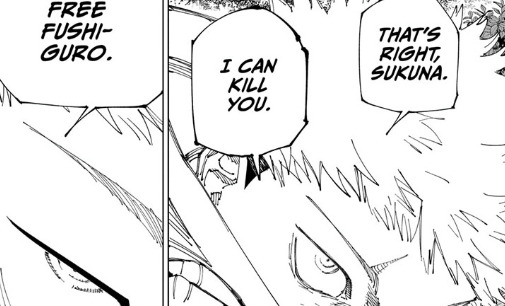
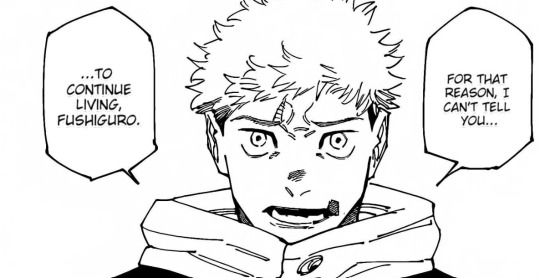
PITY VS. EMPATHY
Jujutsu Kaisen Chapter 265 quickly surpassed Gojo's death chapter as my favorite chapter in the entire manga. It's a high point in both Yuji's character development and the Sukuna fight, a notion most of the fandom agrees with. That being said, it's once again time for me to take a stance contrary to most of the fandom opinion. I was going to make this post two weeks ago but I'm glad I waited, because this week's chapter helps me illustrate my point in the contrasting way Yuji treats Sukuna and Megumi.
As you can probably tell by the title, my hot take of the week is that what Yuji is showing Sukuna isn't true empathy. It's not atn attempt to understand Sukuna's worldview, but rather condescending pity from a place looking down on Sukuna, which is why it infuriates him so much. This is illustrated in Yuji's atual actions this chapter, which is to go at great length to show memories from his past to make Sukuna understand HIM and not the other way around.
Whereas, what Yuji shows Megumi is compassion, because he's not telling Megumi what to feel or imposing his own views on him but rather accepting the fact that Megumi might be suffering too much to keep living on.
I'll explain more under the cut:
Guanyin, Goddess of Mercy
Yuji is, not as far along in his character development as he might seem. I don't want to undervalue his growth, this chapter shows definite progress, and I understand why it would seem that this is the completion of his arc of being a cog in society because he straight up says people don't need roles, and it seems like the manga is quickly coming to a close.
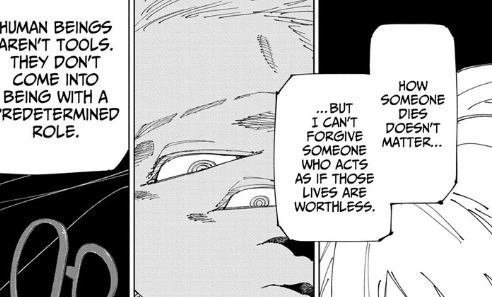
However, sometimes characters words don't exactly match their actions. Sometimes characters aren't self aware. People often call characters multi-layered and complex, but what does that mean exactly? For me, a mutli-layered character is the embodiment of "people are never what they appear to be."
A story has multiple layers when you're not supposed to take everything the author says at face value. Every time you read a story, whether you are aware of it or not you engage in some level of personal interpretation. You're not supposed to automatically accept everything the author feeds you without question. Therefore characters are not exactly what they are stated to be, and good character writing allows room for interpretation for what is going on in a character's head beneath the surface.
In a jungian sense this would be the ice berg model of consciousness. There's the persona, or the ego, which is what the person presents to the world and the people around them. Their own-self conceived image. Then there's the part of the ice berg that submerged, which accounts for all of their internal mechanisms and facets of their personality they aren't aware of. This could range from anything to like, how trauma can affect people's actions without them realizing it, things they are in denial of and don't want to admit to themselves or just like someone who's bossy but not self-aware about that trait until someone else points it out for them.
Everyone's have that friend who you try to call them out on their bad behavior, but no matter how hard you try they just won't admit it. That alone illustrates there's a difference between self-perception, how we view ourselves, behavior - how we actually interact with the world, and pther people's perception of us. Somewhere in between these multiple points of view there exists a vague outline of a person, and personality, whatever "personality" means exactly.
To step away from Jung, in a character writing sense this means a good character's motivations, personality, and actions can be viewed from multiple angles. There is conflict between how Yuji views himself, his actual actions in the story, how other characters might view him, and how he's framed in the story. The first two, Yuji's self-assigned roles, and what his actual actions amount to is a conflict that's run over the entire story.
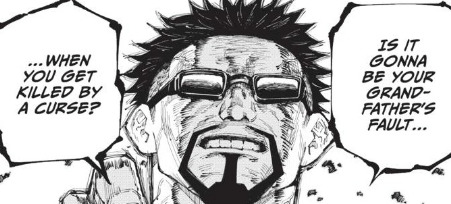
It starts from chapter three, where Yuji's answer for why he wants to become a sorcerer is that he wants to fulfill his grandfather's dying wish, and Yaga immediately says "Is that what you really believe, or are you just using your grandfather as an excuse?" The story shows us Yaga was right to point out the discord between Yuji's stated motivation and his actual desires because Yuji changes his answer.
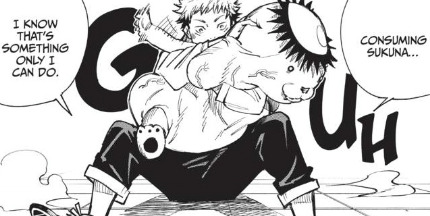
This stated motivation, "To do something that only I can do", or have a role as another way of putting it is Yuji's central motivation for most of the manga. Of course as I said people have multiple layers, so he can also have multiple motivations. Yuji's desire to have a good death, him wanting to be surrounded by people when he dies, his belief that fulfilling his role as a sorcerer will save other people from curses, all of these things are equally true but that one desire to have a role to play in the grand scheme of things is at the center of it.
The role Yuji has chosen is to kill curses so people can have more natural deaths, and also to stop more victims of curses from piling up. He's also resolved from the start to die with Sukuna in his body, to also spare victims of curses Sukuna might attract, and also kill Sukuna for good.
Even these stated motions are challenged right away, and then again continually through the comic.
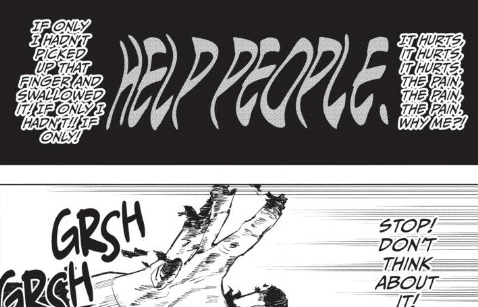
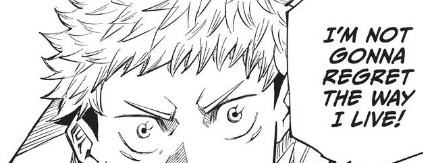
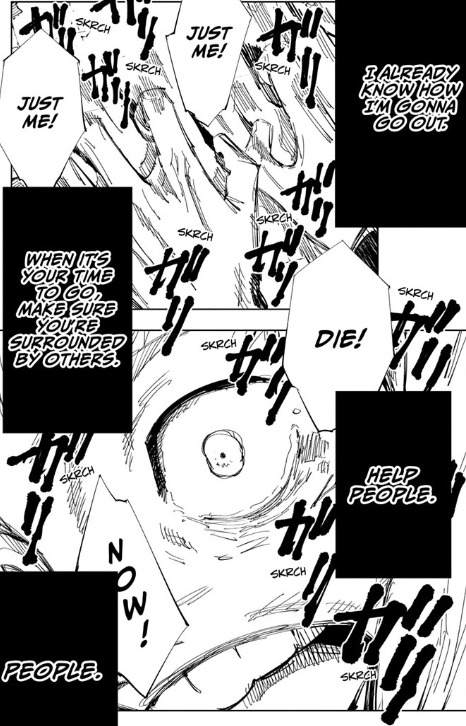
I'm not going to go over Yuji's entire arc here, but the fact that Yuji is someone constantly interrogated for his motivations and even punished in story for his altruism is a constant pattern in his character arc.
It extends deeper than just the fact that Yuji is a selfless person in a world where selfish people like Mei Mei, and Sukuna get ahead while people like Nanami die young. A world where it is in your best interest to stick out your neck for others.
For me a lot of the harsh consequences Yuji's conflict in the story also centers around the fact that he can never live up to the role that he has assigned himself. Not only is Yuji mistaken in his perception of himself, but the fandom in general is as well, because most people tend to take Yuji's stated desire to guide people to good deaths and save them at face value.
For example, people were excited to point out the Guanyin symbolism directly referenced this chapter, and also the significance of the seal for Yuji's domain.

There is much speculation, but it seems certain that this hand sign is an invocation of Ksitigarbha, a revered bodhisattva in East Asian Buddhism. Ksitigarbha is also known as Jizo Bodhisattva in Japan. His name can be translated as Earth Womb, Earth Matrix, and Earth Store. These translations evoke the image of a vessel, which seems relevant to Yuji's role as Sukuna's vessel.
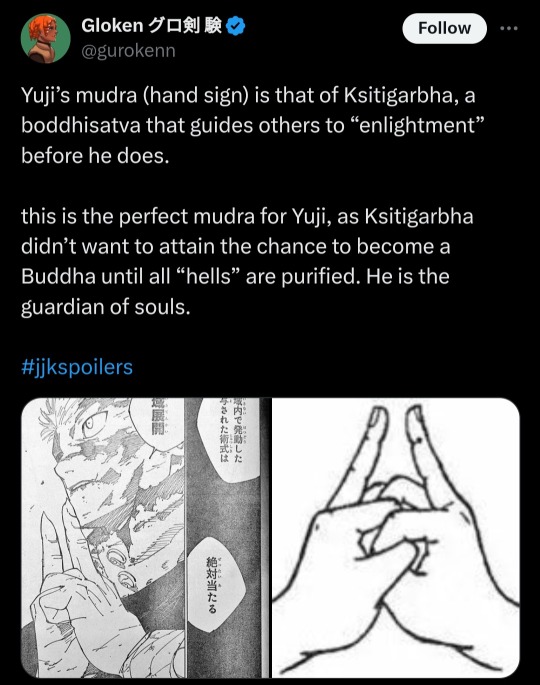
While I agree the symbolism is well suited for Yuji's goals, someone who wished to guide people to a more peaceful death, and also the way Yuji opposes Sukuna right now determined to kill him who lingers in this world as a parasite for a thousand years finally back to the cycle of reincarnation. It even alligns with his desire to try and make Sukuna understand the value in one individual's life by showing him his memories. In that way Yuji is fitting the role of someone guiding others to enlightenment.
However, Yuji is not a bodhivista in the end. He is a normal teenage boy. In fact this is the crux of Yuji's character to me, he is a good kid, but he's not as good as he thinks he is. If anything this is what this chapter goes to great length to demonstrate, that Yuji despite being a science experiment to create the perfect vessel for Sukuna for Kenjaku's 1,000 year plan, had a normal childhood. All of the things Yuji says in this chapter are for the most parts the musing of a normal kid his age.
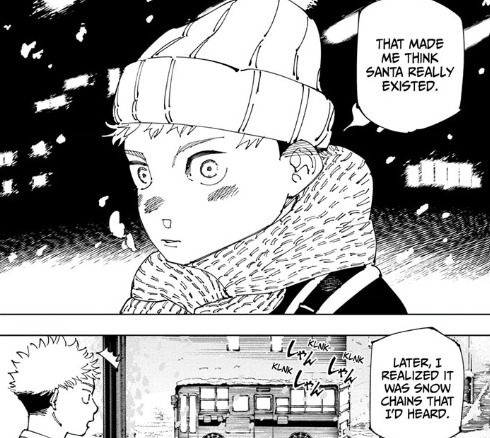
This isn't me criticizing Yuji. I'm just trying to state the message I believe Gege is getting across in this chapter. It's similiar to the conclusion Yuji himself comes to, the conclusion that the value in life lies in the memories you make on a day to day basis, even if you're not living a life full of adventure.
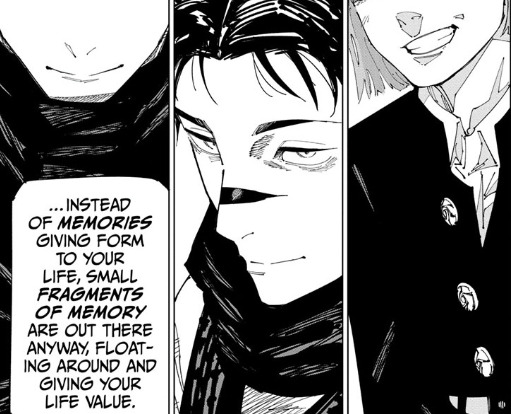
Yuji's conflict is that he pursues the role of a bodhisvatta, and he holds himself to the standard too of someone who exists to be a sorcerer because by doing his job as a sorcerer people will get saved as a result. However, Yuji as a person will always fall short of this ideal, because ideals by the nature of them being IDEAL and therefore not compatible with reality.
To use an example for another media, it doesn't matter how hard Shirou Emiya strives to save others, or how selfless he tries to be, he will always fall short because the ideal of saving absolutely everyone is impossible. However, in most versions of Fate's story Shirou absolutely refuses to compromise on this and in the future, Shirou will continue to strive towards the ideal of saving everyone until his inability to achieve that ideal and the number of people he's failed to save eventually breaks him.
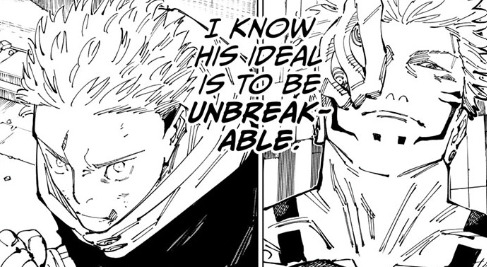
So Yuji may genuinely hold onto an unbreakable ideal, but is his inability to let go of that ideal necessarily a good thing? His ideal might break but what about Yuji as a person? Yuji will in the end always fall short of that ideal because of his humanity, especially since Yuji is the most human character in the story and practically the only one with a normal background.
There's also as I stated above Yuji might not be aware himself of the ways he falls short of his ideal, because he has a flawed self perception. Yuji is getting closer with his revelation in this chapter of looking at reality instead of trying to have a role like a character in the story, but that doesn't mean he's finished (since the story's not finished) or he's become a fully realized character.
One of my favorite quotes from my favorite Yuji video helps describe the point I'm getting at with Yuji's lack of self awareness and the way he sometimes falls short of the savior he sees himself as.
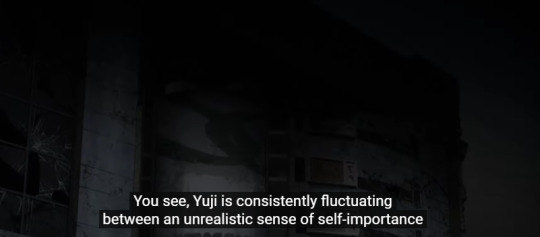
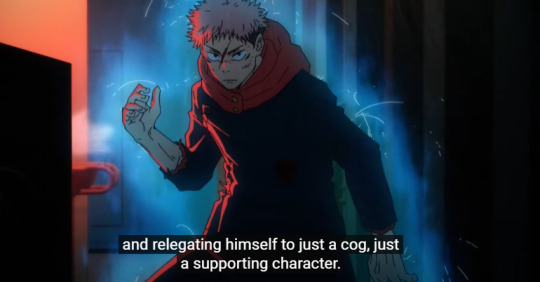
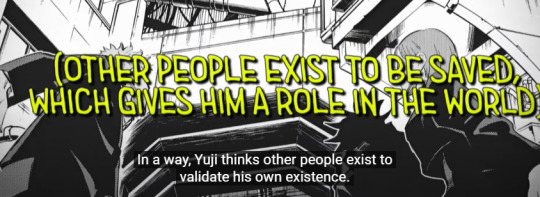
By assigning himself the role as heroes, and the other characters as victims to be saved Yuji sort of condescends to the people he endeavors to save. I describe this as condescending because this way he doesn't see the people he saves as fully fleshed out human beings who are separate individuals from himself.
Yuji is alligned with Higuruma of all people, someone who shares Yuji's savior complex and becomes disillusioned because the people he decided of his own free will to protect as a defense attorney are not perfect victims.
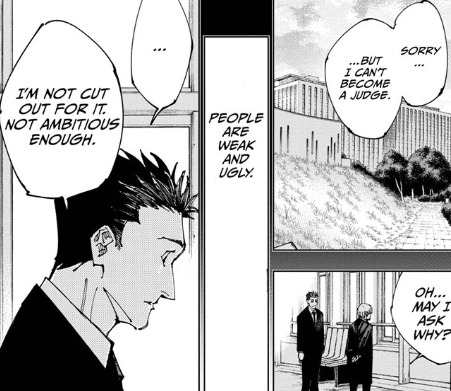
Someone who becomes disillusioned when looking at flaws in other people, and also cannot deal with his own guilt when he too, becomes like the crimminals he once defended after becoming a murderer.
In fact Yuji sees himself in Higuruma's inability to live with his guilt, and only being able to see himself atoning with his death. Yet, despite Yuji seeing himself Yuji also seems uneasy with Higuruma being unable to see one other way forward in life.
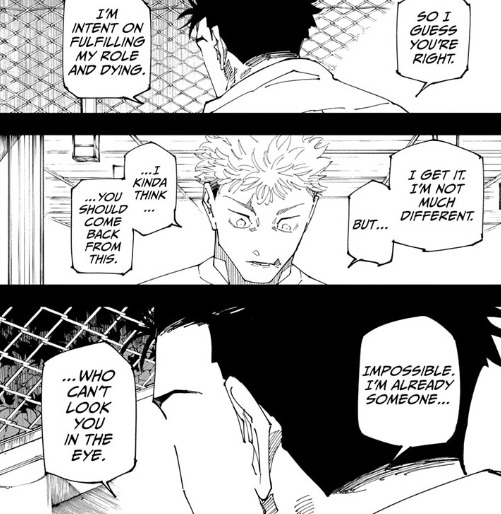
Also, remember that Higuruma is a defense attorney. The whole point is he's supposed to defend crimminals even if he knows they did the crime and try to get them off their sentence and win the trial. Therefore at this moment Higuruma has failed to live up to his ideal.
There's another character Yuji is paralleled to constantly, who also shares Yuji's symbolism of being associated with a divine, and benevolent figure.
Geto's ears, his dressing as a monk in a Gojo-gesa, this official art all connect Geto to be Budha and yet it's quite obvious that Geto has failed entirely to live up to his role as the budha.
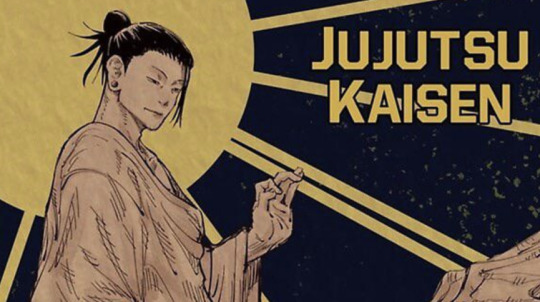
There's so much symbolism aligning Geto as a divine figure bringing salvation to others, and this corresponds to his original ideal as a sorcerer who belived that sorcerers had an obligation to use their powers to protect others, because in a just society the strong protect the weak.
Geto is an outsider who wasn't born into the Jujutsu World who entered in with an attitude different from most sorcerers by trying to become a sorcerer for altruistic reasons. However, Geto, like Higuruma grows disillusioned when he's confronted with the fact that the people he wants to save are flawed.
However, Geto's ideal was mistaken to begin with because much like Yuji, by distinctly separating people into the weak and the strong, he's separating them into two categories where the former is inherently inferior to the latter. Other people existed to be saved by Geto. He couldn't cope with the fact that the people he wanted to save were people and not victims.
So we finally circle back to chapter 265 where Yuji is attempting to relate to Sukuna and see some humanity in him... or is he?
Yuji shares the same flaw of both Geto, and Higuruma where he sees the people he wants to save as existing in a separate category than himself. So, is what Yuji is offering Sukuna understanding and an attempt to emotionally reach out to him, or is he attempting to show Sukuna the mercy of a conqueror.
Even if Yuji wins the battle and spares Sukuna's life in the end, it won't be Yuji's compassion or empathy that won him the fight. If Yuji wins against Sukuna it's simply because he's stronger. Yuji only feels confident trying to offer Sukuna in the first place because this time he's finally confident he's stronger. It's mercy, offered at a threat with the same time. Yuji, like Geto, is still separating people in categories of strong and weak, he's just showing mercy to someone he now considers weaker than him which is why Sukuna reacted the way he did.
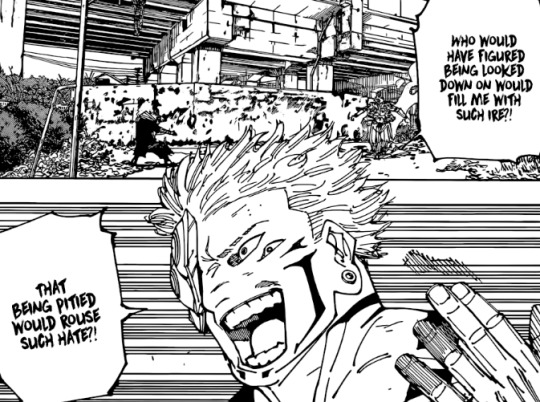
As I said above, Sukuna begins by just assuming that Yuji had just let go of his anger, and was now trying to reach out to him on some other way. He calls him weak for being unable to keep hating his worst enemy, because in Sukuna's world view Yuji should keep hating him and wanting to defeat him with all his strength to the end. Sukuna mistakenly believes for a moment that Yuji is the kind of person who, cannot sustain his anger even towards his worst enemy.
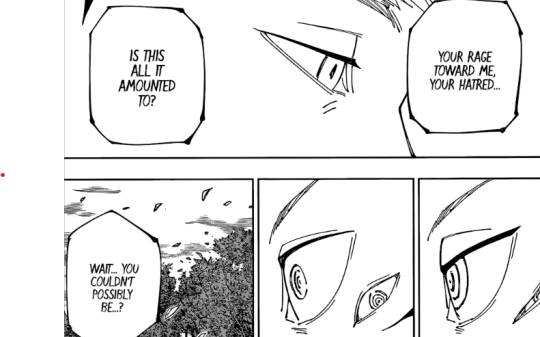
It's when he realizes that Yuji is just showing him simple pity that he snaps. Yuji doesn't care for understanding Sukuna's worldview or seeing the humanity in him, in the same chapter he says he can't forgive people who act like lives are worthless.
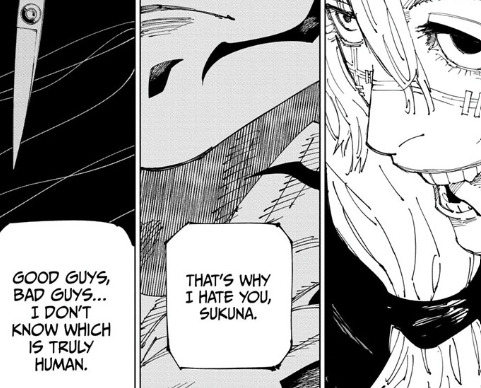
To Yuji's credit he admits he doesn't really know which side of the fight is truly human, or whether or not he's right, he admits it's his own personal belief. A lot of Yuji's wisdom this chapter, I'd argue, comes from admitting the things he does not know, and acknowledging that there's no objective truth or "meaning" to the world. However, he still separates people into "good guys, and bad guys".
Yuji isn't actually that interested in considering the perspective of those he considers the "bad guys" he just still had a faint hope that he could somehow convince Sukuna to see worth in his life by sharing memories, therefore convince Sukuna that an individual's life can have value.
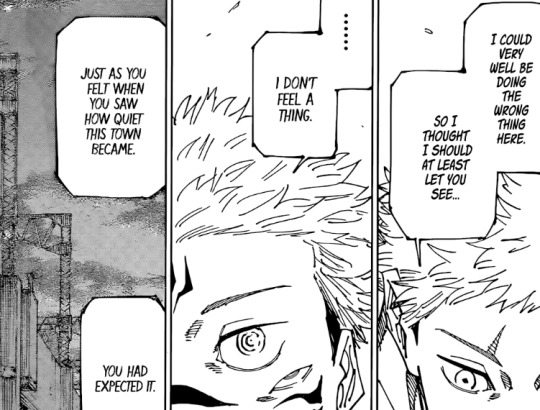
He doesn't want to understand what Sukuna thinks, he wanted to change the way Sukuna thought so it was more like himself. Yuji doesn't ask Sukuna any real questions about himself while exploring his memories. Kind of ironic, because for some reason Sukuna of all people was patiently listening and even engaging Yuji in conversation while he went through the most mundane memories of his childhood.
Irony on top of irony, Yuji's worldview does resemble Sukuna's in some ways. They're supposed to mirror each other after all, Yuji is literally the son of his identical twin brother reincarnated. First and foremost Yuji's offer of mercy isn't really breaking away from Sukuna's ultimate ideal of "Might Makes Right." Yuji isn't seeking some other way of settling this besides fighting Sukuna, he's going to make Sukuna submit because he's stronger.
Maybe there was no hypothetical "third way" for Yuji to put down Sukuna other than fist fighting him into submission. There probably wasn't, Sukuna's pretty up front what he's about, and what he's about is being the strongest and nothing more. He lives and dies by violence, a Sukuna who isn't the strongest is nothing more than a corpse so can that person be reached? However, I just wanted to point out that Yuji wasn't interest in solving this in any way other than a fist fight to begin with. As opposed to say, the way that Takaba handled Kenjaku taking a third route by making Kenjaku feel entertained for the first time in 1,000 years.
In the middle of that fight Takaba even APOLOGIZES to Kenjaku, for saying that it doens't matter if he doesn't understand his audience and he fails to make 1% of them laugh as long as the other 99% of them are laughing and states it's his duty to make everyone laugh otherwise he's failed as a comedian.
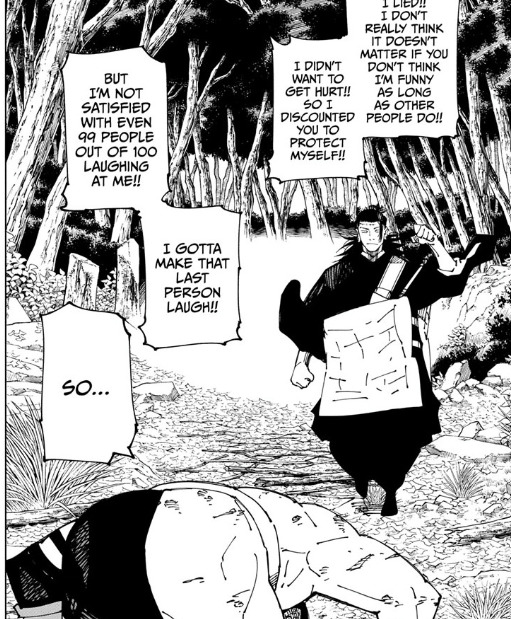
Yet, another reason why this is the greatest fight in the manga. Yuta even remarks in the end that Takaba isn't someone who can kill people. Not only does his cursed technique negate most damage to him by turning it into cartoonish antics, but Takaba's comedy is also all about understanding his audience and trying to get his audience to understand him because his comedy began when he clowned around as a kid when he was lonely. All of this to say we've been shown more points of view than just "Might makes Right" and there are characters who've resolved conflicts in other ways. Kenjaku is also, probably as monstrous as Sukuna, and yet Takaba engaged him right from the start by asking him about his motivations and if there was some other way he'd be happy than the merger.
You could argue that maybe Sukuna can't be understood. Characters in the story certainly try to and all they amount to doing is projecting their own ideas onto Sukuna. Yorozu projects her obsession with love onto Sukuna and we get the idea that Sukuna must somehow be lonely at the top, but in the end Gege subverts this expectation by showing us that Sukuna was never lonely, rather characters like Kashimo and Gojo projected their feelings of unresolved loneliness onto him. They are strong, and he is strong, ergo he must feel the same crushing loneliness as them. Gojo himself demosntrates not understanding Sukuna as he expresses regret in the afterlife that he was unable to make Sukuna go all out and that he related to that guy's loneliness only for Sukuna's response to be a very gratified "You cleared my skies."
Sukuna: Others love us for our strength, and we respond to that love.
The twist of that is Kashimo and by extension the audience assume that Sukuna must not understand love, and therefore he's lonely. However, Sukuna all along had his own definition of love, that people express their love and admiration for him by trying to fight him and he receives their love by facing them at his full strength and giving them the chance to prove themselves. Sukuna's habit of toying with his opponents is an extension of this he wants to see them realize their full potential in their fights with him. Sukuna does understand love, he just REJECTS our understanding of love. Sukuna does not think in the way that we do, but that doesn't mean he doesn't have things he values, or is devoid of positive traits. Respect for his opponents, honoring strength, these are all values they're just not Yuji's values.
As stated above, the irony of all this is that Yuji does buy into "Might makes Right" to an extent. To reiterate, following Geto's "the strong exist to protect the weak" still divides people into two categories strong and weak and implies the weak are helpless. A benevolent might makes right, as you might say. Yuji wants to show compassion to the weak, but he also loathes weakness, he loathes himself for being weak.
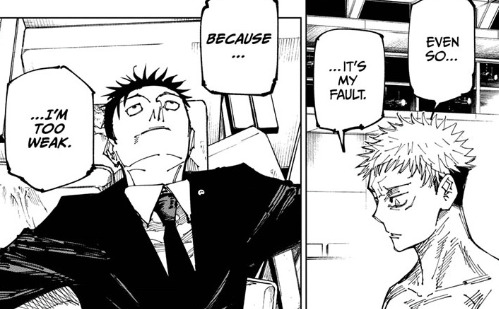
"There still may be lots of people who are weak like you."
Higuruma even points out the flaw in his mindset, well if you loathe yourself for being weak, then what about other people who are weak do you loathe them too? I think it's no coincidence that Yuji is paralleled not one, but two (Geto, Higuruma) people who tried to use their strength in benevolent ways only to start out loathing the people they were trying to help. I'm not saying that Yuji secretly hates weak people, but his mindset of black and white, weak and strong, a mindset that can't accept the greys of reality is a dangerous mindset to have and Yuji has the potential to become like those two.
However, these parallels exist for us the audience to see just how close Yuji was to repeating the cycle, because it makes it that much more meaningful when Yuji grows in ways that Geto and Higuruma doesn't to move one step forward towards breaking that cycle instead.
Yuji is someone who experiences the same loneliness as Sukuna and Gojo for being the strongest, though to a lesser extent because he wasn't born into the realm of sorcerers. At the start of the manga we're introduced to Yuji a kid who despite being someone friendly to everyone he meets and incredibly social, has a friend group consisting of two friends. Two friends who hang out with him because they need a third member for their occult club. Yuji for the whole manga excluding one exception really only knows how to form relationships based on someone else needing him.
Noritoshi Kamo: Itadori why did you become a Jujutsu Sorcerer? Itadori Yuji: It just sort of happened. i'm a loner. I wanna help a lot of people so when I die I'll be surrounded by people.
Yuji has also appeared in flashbacks in early culling game as someone who doesn't really understand, or even take notice of weak people. Yuji in Amai Rin's flashback is beating up bullies, a heroic notion, but from the perspective of somone spineless like Amai who was just going along with the bullies so he himself wouldn't be bullied because he didn't have the strength to stand up with them, and wasn't born with the body of an MMA fighter at fifteen, Yuji looks scary.
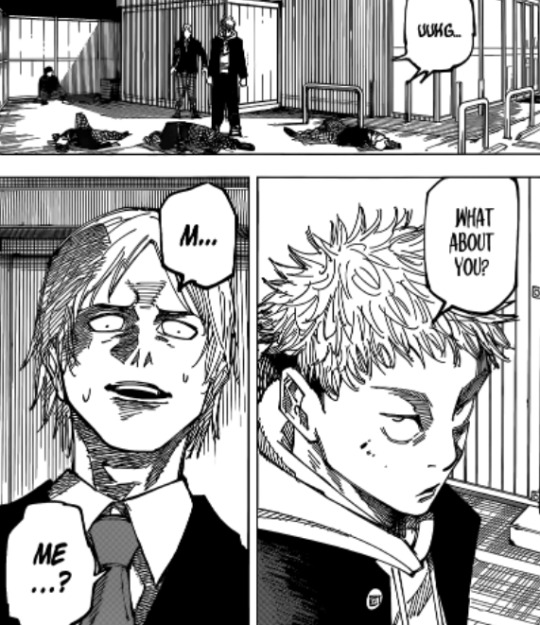
The reason why reducing people to labels like strong and weak is reductive is that humans are complex and contradictory creatures. Let's take Amai Rin for example, an incredibly minor character. In the real world, Amai Rin would be someone as equally complex as Gojo Satoru. Amai Rin a middle school bully would have just as many layers to his personality, inconsistencies, contradictory behavior, different sides of himself as Gojo Satoru himself.
Humans are complex in the first place because we can't see inside their heads, we can only see inside our own heads and know that we're complex and sometimes say things we don't mean, behave differently depending on the situation, do things we're not proud of, but we also usually don't perceive others the same way because we are not inside their heads like our own. Amai Rin is just as complex and multifaceted a human being as Gojo Satoru, he is a person with his own memories and life experiences that shape him, but from Gojo's worldview Amai Rin is a minor character. By reducing him into someone weak, Gojo doesn't care to try understanding him.
So Yuji for the longest time does not try to see the humanity in weak people (except for his big moment with Junpei) he just sees them as people to be saved. Which is why his real moment of progress to me comes the next chapter, with the way he shows empathy to Megumi.
Yuji begins when speaking to Megumi by relating his frustration with his grandfather for not wanting to go through chemo and accepting his own death in old age. Yuji is now mature enough to understand that just because his young body is tough enough to endure chemo, doesn't mean an old man's body can withstand that pain. When he was young Yuji had a very immature viewset of "Well, I can endure it, so why can't they?"
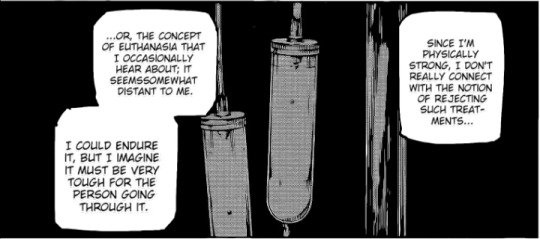
Yuji then compares the situation with his grandfather to Megumi. Yuji wanted his grandfather to keep living, so he couldn't understand why he wouldn't even try the chemo. Yuji wants Megumi to keep living, but he now understand why Megumi wants to give up. Yuji' fe elings of wanting Megumi to live are not more important than Megumi's own feelings of despair and wanting to escape pain.
Yuji is no longer imposing his feelings onto Megumi. Yuji is respecting Megumi's feelings, because in the end he can't FORCE Megumi to live. It has to be Megumi's choice whether he wants to live or not.
Yuji is no longer pushing Megumi away, or acting protective of him, while disregarding his feelings. He has gone from "as long as I'm around you'll suffer" to "I'll be lonely without you." Yuji doesn't ASK Megumi to live even though he wants to, because he knows he can't tell Megumi to keep on living. What Yuji does is just an honest expression of his own feelings. He's sharing his own feelings after listening to Megumi's ideal life with Tsumiki and Yuji, because that's what empathy is, an exchange, a conversation.
People often jokingly use the term "yap sessh" on Twitter, but yeah that's the different between a conversation and a "yap sessh" in the former you actually care what the other person has to say, in a latter it's only about expressing your own opinion.
That's why this panel, is such a perfect contrast with this panel.
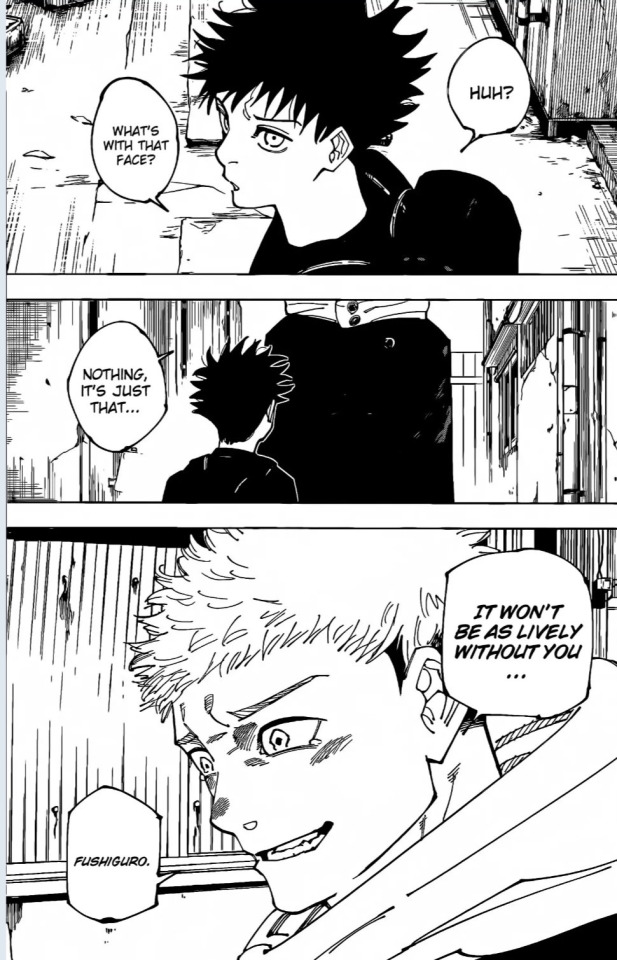
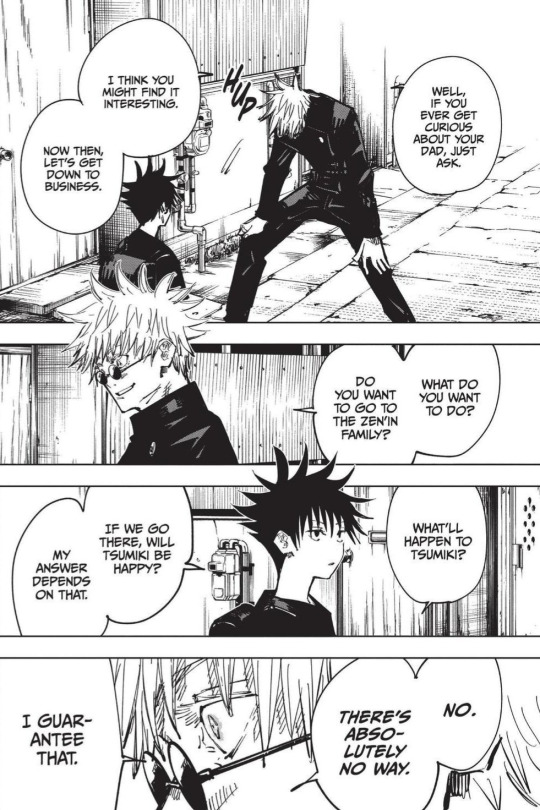
One is Yuji offering Megumi a choice. The other is Gojo taking Megumi's choices away by giving him the false choice of "go to the Zen'in Clan and be a sorcerer and your sister will be abused, or come with me and be a sorcerer." Gojo railroaded Megumi into being a sorcerer and never let him decide for himself if he wanted a normal life. Gojo didn't see Megumi as his own person either, he, just like the Zen'in Clan just saw Megumi as the holder of the Ten Shadows Technique.
This is entirely different to Yuji who respects Megumi's feelings. Yuji expresses that he'll be lonely without Megumi, but that's just laying the cards on the table. In the end Yuji leaves what happens next entirely in Megumi's hands. Yuji cannot tell Megumi to live, even though he wants him to live so badly, he cannot tell Megumi to just get stronger and keep on trucking because he's not Megumi, he's not experiencing Megumi's pain right now.
Yuji does not tell Megumi to live and therefore becomes the first person in Megumi's entire life to give him a choice. This choice is the most important choice of all, a choice we make every day of our lives. The choice of whether we want to keep on living in this world.
Hopefully, Megumi chooses yes.
#LONG /////////////////// again im so sorry idk why i cant shut up#EDIT maybe i shud hv made my own post AFTER rbing but this was so eye-opening i got excited i guess#anyways..Love & Kisses#jjk manga spoilers#jjk
559 notes
·
View notes
Text
Drops in a Bucket, Splashes on the Ground
Also available on AO3! Tags: Mature, Graphic Depictions Of Violence, Major Character Death, Gen, Whirl (Transformers), Implied/Referenced Abuse, Alternate Universe - Canon Divergence, Whirl is Primus AU, Angst, would you believe me if i said i didnt set out to write another angst fic, whirl's just like that Wordcount: 4202 Notes: I would highly recommend you read "Bullets" or at least be familiar with Whirl's abuse of Rotorstorm before reading this fic. The scene containing graphic violence begins with "Tacticians always struggle..." and the scene referencing abuse begins "He shoves his way..." Please feel free to reach out if you need any further information.
~*~
“And I guess old Primus makes five.”
“Hah! No, no, no. That’s not Primus… you’re Primus.”
~*~
Whirl has never been intimidated before. Not so intentionally, not by bots whose forged bodies have been piled on with armor and weaponry, no expenses spared by the ganglords. The Heavies rolled up on treads that left gouges in the streets, painful marks that tomorrow’s taxes will go to fixing, and their transformations took a full five seconds as excess plating moved out of the way while their protoforms tried to bend per their original configurations. They wear identical red visors and dark gray masks: faces, certainly, but only in the barest sense of the word, enough to separate them from lowlifes without affording them identity. It is impossible to tell one from the other and Whirl knows, intrinsically, that it will not matter.
~*~
Rung is the only one who doesn’t flinch. Whirl stands over Adaptus’ body, freshly relieved of what they can all agree was a spectacularly ugly head, and puts away his gun.
“Right,” he says, with a meaningful glance out the window. “Want to agree none of us heard that?”
“Whirl!” Rodimus shouts. “You can’t just kill a god!”
The body explodes into a pile of dust.
“Sure I can,” Whirl says, shaking it off his foot even as he leans down to inspect the scrapple. “Hey Ratch, can you rig me to explode next time I get shot?”
“Is it true?” Nautica asks, doing her intellect a massive disservice by stepping in front of the unhinged bot with a blaster.
“Obviously not,” Ratchet says. “He was lying.”
Whirl nods.
“Yeah. You think I would keep it a secret from any of you if I was a god? You think Cyclonus would ever hear the end of it? Nah.” He stands, kicking pile and sending a spray of metallic dust into the air. “Awesome way to go, though, can’t say I’m not jealous.”
“That doesn’t mean you had to kill him for it.”
“So, you’re not Primus?” Nautica asks. She hasn’t moved, her arms crossed in front of her. If Whirl had been her creator (and he isn’t, he already has his claws full with a nest of scraplets), he would have been pretty proud of her right now.
“Nope!” he says. “I’ve never vouched for the universe before, but that kind of joke would take on an extra level of cruel, don’t you think?”
“Got to agree with Whirl, here,” Rodimus says, a hand on Nautica’s shoulder drawing her back. “I could buy pretty much anyone else. Maybe not Rung, but, say, Velocity? She could be Primus. Or Roller. I guess not Megatron, since we saw him come online, but—”
“The point, Rodimus,” Ratchet deadpans.
“The point is, not Whirl,” Rodimus said, sweeping his hands up to gesture at him. “I get Primus is disappointed in us. We are a textbook example of why a race of sentient war machines should never be left to their own devices, combined with a case study on how to avoid learning from every mistake you’ve ever made. But I really don’t think that disappointment would translate to actively hunting us for sport. Isn’t Primus supposed to be all about forgiveness and loving your cellmate?”
“Right,” Whirl says, clacking his pincers together in his approximation of a snap. “An angry god is so cliché.”
“I don’t think anyone knows what Primus believed,” Rung says. Oh no. He’s taken off his glasses. “I don’t see any reason he couldn’t be Whirl.”
“How about we start where the part where gods don’t exist, and Whirl does?” Ratchet suggests.
“I… I am Solomus, though.”
The whole group turns to the offending voice. Whirl goes for his gun and Rodimus knocks it out of his hand, a stern finger silently telling him not to kill any more gods. As if being an ex-Matrix bearer gives him some sort of say.
Tyrest has not stopped touching his gaudy mantelpiece, poking at the holes. It wouldn’t be so disturbing, except he’s staring at Whirl while he does it.
“Primus, don’t you remember?” he asks.
“Hey, let’s watch the fragging language.”
“Adaptus wanted to send our creations to pointless war,” Tyrest goes on. “Violence for the sake of violence, conquests built on the backs of others. We fought him.” He steps forward and reaches for Whirl. “Together, we—”
Whirl jerks back with his claws extended out.
“I will cut your hand off, I swear to—I swear.”
He is saved from any more interrogation by the ground violently rumbling underneath them.
“Okay, so regardless of whatever’s Whirl’s deal is, we do still have at least one Primus to worry about,” Rodimus says, looking out the window at the approximation of what Whirl, personally, had always assumed god would look like. “Solomus, you still got your teleporting rigged up?”
~*~
No one ever considered giving The Institute a waiting room, so Whirl stands to one side of the hallway while the butchers discuss his case. He knows his proposal intrigues them: they have never had an opportunity to shadowplay a willing subject before. What is there to learn from a brain that does not fight them every step of the way? What backdoors exist that every other victim kept hidden? Whirl does not care about the potential scientific advancements his offer provides. He just wants to stop dreaming of gears, lose the phantom aches of his fingers. He wants to look in a mirror and see nothing: not himself, not a monster. Just an object, fulfilling its purpose.
The scientists who walk by him in the halls stare. Everyone stares, but the look they give him is different. They do not find him exceptional, nor do they feel for him pity or contempt. He is no marvel. He is a creation, perfectly engineered to suit its purpose, every detail minded with care to ensure it all works together as an ideal mechanism. He wishes he could see himself through their eyes.
The door beside him slides open and a bot he has never seen before steps out. His helm comes up no higher than Whirl’s waist and his large yellow optics do not look up from his datapad.
“Whirl of Polyhex, the panel has elected to reject your petition,” he says. “I am to remind—”
“What?” Whirl startles; his new head shoots upward, forcing him into an angle that is both unnatural and instinctual. “Why? Ice Pick said he could—”
“I am to remind you that you have signed a nondisclosure agreement; failure to comply will result in penalty of death.” The little bot flares his plating, the click of a motor lock setting it in place. “You will now submit to full stasis and be escorted back to your home.”
The jack comes from behind.
~*~
“This is my hab suite.”
Whirl knows the tonal difference between a bullet hitting living metal and a wall. He scowls and gives up, waving Cyclonus inside.
“My room’s a mess,” he says. “Think I’m gonna crash here for a while.”
Cyclonus comes in and sits beside Whirl on the berth. When the door slides shut, they are visible only by their biolights: Whirl closed the shutters when he came in, the stars too much like blinking numbers. Cyclonus is a surprisingly quiet machine. His presence comes with none of the usual hisses and clicks one would normally get with their kind, like each component was designed specifically to work with those around it. Compared to Whirl, whose body is a wreck of pieces that almost fit together, clinking and scraping through their standard functions, he practically doesn’t exist.
“This is slagged, huh?” Whirl asks.
Cyclonus thinks on it a moment, then there is a shift of plating as he nods. Is it an admission, a confession? Pri—frag, Whirl doesn’t want to have to start thinking about that.
“Sorry,” he says.
“You don’t need to—”
“Scrap, you’re right. What am I doing?” Whirl laughs. “I’m infallible now, right? It’s all been part of my grand plan for Cybertron. I should be saying you’re welcome; you should be thanking me.”
Cyclonus sighs, a rush of air out his vents.
“Is there anything I can do for you?” he asks.
Whirl pokes and pinches at his own plating, trying to make sense of it.
“Yeah,” he says. “Start praying, and keep Megatron far away from me.”
~*~
He’s spent two days in the holding cell before he realizes no one else is coming for him.
That Orion Pax… he’s good, and Whirl’s not sure whether it’s the kind that gets people hired or gets people killed. Not that it matters, not that he cares. The Senate’s going to crush all of them one by one, like little cans of oil under a rolling tank. He thought being a tread would come with some measure of relief; instead, it just landed him in a hole.
He digs a claw tip into the wall, another score among a small collection. He has been trying to reconstruct the miner’s face, what it looked like in the split second between recognizing he had been struck and realizing there was more to come. He can’t relish a memory if he can’t keep it, and he’s already struggling well enough to accomplish the former. This assignment was supposed to be a release. Look down at the big thinker and imagine in his place Senator Proteus, Sentinel Prime, the faceless Functionist Council. Tell himself that this is what it would feel like to rip their plating open until their priceless energon spilled onto a dirty floor.
The face, though, it’s escaping him. How can he fell anything about a person with no face? What relief is there to be found in beating the slag out of a nobody? He is trying so hard to adapt, but it’s like his processor is working against him, reminding him how far he got before he was reeled back in. The silhouette of his sketch is familiar.
His claws hurt where he has worn the tip blunt, and the portrait is still incomplete.
~*~
“I don’t make Matrixes,” he insists. The group was polite enough to knock once they found him, but they’re failing to pick up the hint that he wants all of them to go away, right now, and leave him alone forever.
“Well, Epistemus says you can,” Rodimus says, dentae blocked together. “Why do all the other gods have their memories back, but not you?”
“I dunno, maybe Needles can stick me and figure it out.”
It’s almost cute, the way Rewind steps protectively in front of Chromedome.
“Rodimus,” Rung says, trying to get between them, “this isn’t helping.”
“Thank you,” Whirl says. “Now can we get to the part where we storm the planet, guns a-blazin’?”
“That won’t help either.” Rung turns to look at him. “Your memories haven’t been deleted, Whirl. Somehow, there should still be some part of you that remembers creating the Matrix.”
“The Functionists probably took it out,” Whirl says.
“That’s not how mnemosurgery works.”
“Says the dropout.”
“You told me once about your earliest memory,” Rung says. Whirl should be furious that he’s doing this here, in front of people who have no business knowing what’s in his head, but he’s more interested in the way Rung has taken off his glasses and is squinting up at him. “What happened just before it?”
They did not bring Ratchet, a testament to the fact that they will not leave before he gives them answers. He could start lying again, or find another way to forgo the question, but something about Cyclonus’ presence at his back helps him settle down the compulsion. Everybody lies about their forging. Everybody wants to say it was overseen by the Prime, or that they settled into their form like resin poured into a mold, instant and perfect. Whirl has a set of seven stories he deploys on rotation, ranging from heroic to beautifully tragic, and he spends a moment picking through them, trying to remember which was the real one.
“I showed up at the Functionsts’ place to get my docs in order,” he says. “I was… I was trying to get Polyhexian citizenship.” Awful city, but he had always sworn the energon tasted better there than anywhere else.
“But you said you were forged in Polyhex,” Rung says.
“Yeah. It was easier that way.” Whirl puts a claw to his head. “I… augh, nope. No, this is stupid.”
“Whirl—”
“No, I’m done,” he says, pushing Rung away. “Fully done, Rung. That’s right. You were god’s therapist, and he fired you. I’m gonna go take out a planet.”
~*~
Tacticians always struggle with where to put Whirl on a battlefield. On the one hand, he’s an attack helicopter, equipped with long-range cannons and advanced aiming modules. Keeping him in the sky is the perfect way to set up a terrible surprise for Cons on the ground. On the other, he’s Whirl, and facing him head-on can be just as chilling and or fatal.
In the end it rarely matters which call they make because, as stated before, he’s Whirl. He will do whatever he damn well feels like. Right now, that means skimming over the top of the battlefield, sights trained on the odd dot who tries to disgorge themselves from the fighting mass. He is supposed to be providing support to the ground troops, peppering the Decepticon line so they can break through, but no one is going to complain about a few more dead soldiers.
A truck breaks free and he pitches down, giving chase, machine guns firing before he’s got a lock on. The ground explodes in shrapnel as they try to serpentine out of the way, but he keeps firing and soon enough their paths cross.
He riddles them. Their roof is already a puckered, punctured mass of warped metal before their back tires blow and they go skidding and flip onto their side. Their plating shuffles, uncoordinated, as they try to transform, and Whirl goes for the underbelly, shattering the exposed protoform in a burst of pink energon. They slump with their legs disengaged. There is a buzzing, crunching noise as the dying t-cog tries to settle into either mode, then a jet of smoke erupts from the body. The engine has seized, locking it in a permanent limbo.
Whirl spins around to track down his next prey. He loves his job. The Autobots have a need, and he fills it with a gusto that only occasionally gets him in trouble. He’s no hitmech: he lacks the finesse, the style. But he can rain irreverent murder down from the sky, send Cons fleeing just long enough to make them think they had a chance, and he can do it without questioning an order. The war needs people like him.
Two soldiers are trying to escape together, one with their arm over the other’s shoulder, a sparkling stump of a leg between them. Whirl gets low, following them until the roar of his rotors is unmistakable, until they cannot help but turn and he sees their optics. Then he fires.
The wounded one falls first, knocked onto their front and grasping uselessly until their hand is blown off and they go still. The other gets their legs knocked off and goes spinning, landing on their head with a crunch. Whirl keeps advancing, keeps firing, tearing open their plating and reducing their inner working to molten slag, spattering the ground with used energon. They flop, over and over, until Whirl gets bored of the show and hauls off, leaving them almost indistinguishable from the carnage of the land itself.
Whirl hovers over the fighting and looks down while he scans for a target. This high up, visuals are useless for determining Bots from Cons. Little Cybertronians run around, whacking and shooting at each other, falling down, down, down. The metal under their pedes is slippery pink with energon. It splashes against their plating, over their insignias, until they are all just little wandering targets.
Whirl has his job, and he loves it, and he does it well.
~*~
He should feel something, but his spark is a void as he tosses the rest of the guns into the shuttle, all the stuff he held off using because he wasn’t ready to get kicked off the ship. He is not coming back from this. He knows it, so better to take it all.
He’s just fastened the locker when he hears the footsteps on the hatch and looks up. It’s Tailgate, of course. Tailgate, who has a pack hanging from one shoulder and a gun holstered at his side. It’s a shrimpy thing, something Cyclonus taught him to shoot in case they ever got separated, more useful for making noise than taking down an aggressor. It has room for one round of ammo and Whirl doubts he brought a bullet more.
He comes aboard without saying anything and stops beside world, continuing to say nothing. The hand on his pack is clenching: he’s being brave. He’s also waiting for some grand speech, some sacred insight to the nature of their quest and their places in the universe. Well, tough. He should know Whirl better than Primus.
He lifts a claw to shove Tailgate backward and down the hatch, but it stops an inch before Tailgate’s plating. What does it matter? Cyclonus can’t kill him where he’s going and Tailgate himself is just a drop in the bucket. Standing there with his chest puffed out, optic band steely and focused, he looks like any other Cybertronian, never mind a few years left behind.
Whirl retracts his claw. Tailgate nods at him.
Another drop in the bucket.
~*~
He shoves his way to the front row, slamming himself into his chosen seat just ahead of a little spy plane who had been angling for the same spot.
“Buzz off,” he says. Never mind the spy plane outranks him. This is his big day! He got here early so he could get this seat, right in front, though he can barely hold it as the audience fills in around him, so many Bots he does not know and who do not matter. The only one he cares about it up on the stage, smiling with an air of detached cooperation, off in his own head again like he always was. Whirl thought they had made progress on that, but some habits were just too hard to break.
The opening speech is long and predictably boring, lots of talk about this base he has never been on before. Whirl’s engine clicks in agitation. When bots give him dirty looks, he sneers.
“Chronic fanbelt lockup, ever heard of it?” he hisses at them, adding in a few extra ticks for good measure. They go back to minding their own business, but Whirl still catches the optics glancing at him, and his engine goes from annoyed click to angry hum. He knows what they see.
Luckily, the speaker eventually gets over himself and moves on.
“Rotorstorm, will you please step forward?”
Whirl is on his feet before the other copter has a chance to rise, his cheering rising well above the swell of the crowd. He shouts, he stomps his feet, and he bangs his claws together until the bots on either side of him wince, and he gets even louder when he knows Rotorstorm has noticed him.
“Go on, get up there!” he shouts. “You earned this, didn’t you?” The rest of the crowd has calmed down, but he stays standing, arms dropped to his sides. He stares at Rotorstorm as he crosses the stage, shoulders pressed back, each step placed so precisely in front of the last that it must be calculated. He waits until Rotorstorm has reached the edge to sit back down, and then still his optic is pointed, refusing to let Rotorstorm look anywhere else. Rotorstorm’s own optics are wide, though the rest of his expression is slack. His biolights are steady, his ventilations manual and even. He’s perfect.
“Rotorstorm,” the presenter says, “I hope you will forgive us; this is an honor that is long overdue. During the Simanzi Massacre, you singlehandedly scouted a pass through Mount Helix that allowed for the rapid evacuation of the 9th Battalion. Your commanding officers estimate that your decisive actions saved upwards of one thousand Autobot lives.” Whirl’s engine is silent. He’s drinking in every word. “Today, we present you with the Novic Medal for Outstanding Honor. ‘Til all are one.” Rotorstorm ducks his helm as the award is magnetized to the right of his cockpit, finally breaking his optic contact with Whirl.
“’Til all are one,” he repeats, though most of the crowd does not hear him over Whirl’s cheers.
Rotorstorm turns without looking up and returns to his seat. The next recipient is called forward and Whirl walks out.
~*~
He can’t do it. He’ll blame it on the way Tailgate’s plating quietly rattles or Cyclonus’ entire personality as he starts to board, but he shuts off the shuttle’s engine and disembarks with them trailing behind. He retreats to his hab suite, and though he does not invite them he’s glad when they make it inside before the door closes.
“Nobody in the mutiny is allowed to have any of my stuff. I don’t care if Thunderclash is dying again and my innermost energon is the only compatible fuel in the galactic sector, he can’t have it.”
Tailgate nods along, his fingers in a death grip around Whirl’s pincer.
“And when you guys are talking about me later, no one call me anything but Whirl. I’m serious. I don’t know about anything I did before that, so what could it matter?” He looks up at the ceiling. “In fact, don’t tell anyone about the Primus thing. No point.”
Cyclonus is a solid, immobile presence on his other side.
“Am I forgetting anything? Oh, tell Roadbuster I’ll be waiting for him in the pit.”
“Do gods go to the Afterspark?” It’s not clear who Tailgate is asking.
“I definitely don’t plan to stick around and watch over you or whatever. Think I’ve had enough of this universe.” He chuckles, a strained sound. “Yeah. So, that’s it. Better get this show on the road, huh?”
“We’ll be with you the entire time,” Tailgate promises.
“For as long as you want us,” Cyclonus amends.
“Yeah, I know.” He shrugs, laughs again. “I’m not even really scared of the whole dying thing. I’d made peace with that. Whenever there was something I needed to do, I took care of it, so I wouldn’t have to worry about it if the right bullet finally found its mark.” He glances between them. “Now, though… you two better behave, I swear. I’m making it your Primus-sworn duty to take care of and listen to each other, okay?”
Cyclonus nods, and the way he takes it so seriously makes Whirl almost glad he’s on his way out. He couldn’t handle being looked at like that all the time, and especially it’s the way they reach across his lap and entwine their hands that really does him in. He hates them dearly.
“Okay,” he says, winding up his t-cog for the big spin. “Okay, twelve Matrixes. No problem.”
~*~
Whirl times the blinking numbers to the rotations of his spark. 1,600 exactly. He’s done it.
He leans back in his chair but cannot stop staring at the little device in his hands. It is perfect. After years of researching, studying, trying, and failing, the pieces have come together to allow him to create this one perfect thing. He loves it, and a dangerous feeling of pride fills his spark, the kind that has so long been missing from his work in the Aerial Corps. If there is a Primus (and he’s still not sure, whatever the Functionists insist), this is what he built Whirl to do.
He gets up from his desk and walks across his small living space to a shelf. Nearing capacity, it has just enough room for him to push a few previous attempts aside to make room for the latest version. Surrounded by its brethren, it becomes lost almost immediately amid the sea of blinking lights, indistinguishable even from those he considers lesser. Some defects are more obvious than others: one has sat at the same time since the moment he brought it online, while another counts one klik backward for every two forward. But most are just slightly imperfect, necessary steps to get to this point, and he loves them all dearly.
He stands back. It feels like the work of a lifetime, these clocks, though he knows he took up the pursuit relatively recently. It’s just hard to remember how he filled his time before he had this project to work on, and he is again grateful he discovered it at all.
It is a gift to be able to create, he thinks, to cast a broad eye over his creations. The numbers blink at him, all out of tune, and he lets himself imagine being content doing just this for the rest of his life.
#maccadams#transformers#idw#whirl#abuse tw#death tw#my writing#oneshot#drops in a bucket#tbh im just so glad this is done#put too much time into it
8 notes
·
View notes
Text
The Bard Quest
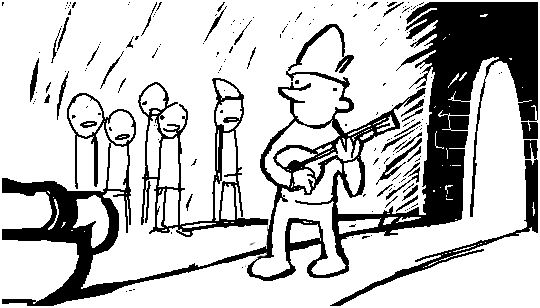
I’ve seen a lot of confusion in the fandom about what a Bard is, how a Bard acts, and how a Bard's path to full development and growth might look, in its purest form.
Some of this is because our canon examples of Bards, in Gamzee and Cronus, are heavily afflicted and influenced by a variety of factors that strongly tint how their Class as a whole is perceived. Some of this is just because people see the ridiculous codpiece and write the whole Class off as a joke. As a Bard, myself, I have some opinions on this topic.
I'd like to start with some common misconceptions about Bards, then discuss how early-stage Bards may appear to lack or be afflicted by their Aspect, followed by an outline of the path a realized Bard might take.
Being a Bard means:
You are likely to spend a portion of your early life ghosting your inverse Class (Maid) and opposing Aspect heavily.
You are likely to have a contentious relationship with your own Aspect and find some elements/expressions of it deeply flawed and frustrating.
You are still fundamentally motivated by your own Aspect, and by that conflict you experience with it.
You most likely have avoidant tendencies and are difficult to pin down firmly.
You have an immense capacity to change your own course and reinvent yourself.
Being a Bard does NOT mean:
You are a terrible person.
You are abusive, evil, or unhinged.
You are incapable of growth.
You are actually primarily driven by your opposing Aspect in disguise.
In more depth, Bards of any Aspect are likely to begin their narrative in a position of lacking or being denied the Aspect that rightfully belongs to them. On the theme of inheritance, their parent or caretaker may be out of the picture or otherwise afflicted, leaving them shortchanged somehow. This lack or loss may also be partially of their own unconscious doing, for various reasons.
A young Bard of SPACE may be trapped in one location, with no idea of the property they actually have access to, potentially cut off from access to green and growing things, and may feel a need to avoid changes or new experiences, or perhaps expressing themselves through visual, tangible art.
A young Bard of TIME may be perpetually short on time, possibly lacking in access to machinery or electronics, and may feel compelled to avoid following schedules, making plans, or even pursuing any musical interests.
A young Bard of MIND may be denied personal choice or decision-making power in their lives, and may be told that they are intellectually sub-par or irrational, so might avoid the pursuit of logic or attempts to reason out the effects of their choices.
A young Bard of HEART may struggle to form a strong sense of personal identity or clearly recognizable empathy, and could be inclined to avoid emotional expression.
A young Bard of HOPE may not be free to pursue imaginative fancies or share their dreams, and could feel pressured to avoid expressing their convictions or wishes.
A young Bard of RAGE may be denied skepticism or doubt, expected to accept everything at face value regardless of evidence to the contrary, and could be driven to avoid the expression or acknowledgment of their own anger or fears.
A young Bard of BREATH may be restricted from pursuing their goals or barred from escaping emotionally taxing situations, and may avoid leadership roles or personal independence.
A young Bard of BLOOD may be deprived of connections or a sense of personal responsibility or prevented from putting down roots, and may avoid both making commitments and building close relationships.
A young Bard of LIFE may be prevented from growth and development in some way, whether physical or psychological, and could feel compelled to avoid healthy eating habits or self-care.
A young Bard of DOOM may be deprived of a sense of causality and structure in their life, through never being allowed to experience the consequences of their actions, and might feel driven to avoid authority or rules.
A young Bard of LIGHT may struggle to be noticed or treated as meaningful, or feel deprived of luck, and might be inclined to avoid pursuing knowledge as well as the spotlight.
A young Bard of VOID may be discouraged from asking questions or exploring potential, as well as evading attention, and may feel pressured to avoid uncertainty, secrets, or confusion of any sort.
At the same time as a Bard shies away from their native Aspect, they are likely to ghost the active creation/provision functions of their inverse Class--Maid--and express a surface interest in concepts connected closely to their opposing Aspect; Space to Time, Mind to Heart, Hope to Rage, Breath to Blood, Life to Doom, Light to Void, and vice versa. Thus, a young Bard of Space (for example) may dabble in music, seem fixated on death and morbidity, or otherwise appear to be creating something Time-related. This shadowing of their inverse role can be quite pronounced, and in a Bard who fails to (or is prevented from) growing into their true capacity, it may linger indefinitely, leaving them very avoidant and uncomfortable around their native Aspect.
As they progress through their story, however, a Bard's superficial ghosting of their Maid of [opposing Aspect] shadow is likely to run dry and fail to satisfy them long-term. What they need, at their core, is access to their own Aspect's wheelhouse, and they are fundamentally driven to chip away at and undermine the elements of it that they dislike and find flawed, not through some deep affection for their opposing Aspect, but through powerful aggravation and dissatisfaction with the weaknesses of their own. Bards inherently understand that an excess of their own Aspect cannot rule, unchecked, and it requires balance and trimming to enable a stronger whole.
Further growth and development of a realized Bard will teach them that their Aspect itself is not only available to them, but can be an effective expression of their will, in their hands. As their access to their Aspect grows, they are likely to be drawn to using it both to 'destroy' others and to weaken said Aspect for the benefit of those around them, when necessary. Again, this can be reflected in a variety of ways, depending on the Aspect involved.
A realized Bard of SPACE may come to possess the understanding that vague and endless patience and flexibility is useless without decisive action, at some point. They may find a talent for artistic protest through graffiti or guerrilla gardening, unleashing their own patience and creativity to combat ineffective uses of space, or turn distance itself into a way to weaken and destroy hindrances.
A realized Bard of TIME may come to possess the understanding that impulsive action can lead to poor results just as planning too rigidly runs the risk of shattering under pressure and being unable to respond to changes. They may turn to music with a strong message or perhaps development of devices, drawing on their ability to problem-solve and act swiftly to eradicate wastes of time, or may use time itself to crumble obstacles.
A realized Bard of MIND may come to possess the understanding that erroneous logic and poor choices are no benefit at all. They may discover a bent for satirical commentary or even teaching, with the right audience and subject--anything which enables them to strengthen and temper the rationale of others by eliminating flaws in it is likely to come more easily to them, and they may employ choices or justice to bring about defeat in those who threaten their side.
A realized Bard of HEART may come to possess the understanding that emotional theatrics and biased assumptions cannot be allowed to run wild. They may have an innate attraction toward fields of psychiatry or counseling, but not with the Sylph's brand of guidance--they are not afraid to unleash their core empathy and strong sense of self in a tactical, no-nonsense strike at the flaws they want to help others eradicate.
A realized Bard of HOPE may come to possess the understanding that foolish naivete and false confidence are no real strength or benefit. They may find the possibility, optimism, and faith exists within themselves to guide others to achieve their own true potential and turn their dreams into reality, or may use the enemy's own braggadocio to bring them down.
A realized Bard of RAGE may come to possess the understanding that confusion and disbelief alone cannot build anything constructive. They may discover that their own doubt and anger can serve as a tool to reform, overhaul, and direct healthy skepticism and frustration towards appropriate targets, or that the restrictive thinking and judgments of the other side can be used against them.
A realized Bard of BREATH may come to possess the understanding that poor leadership and over-investment in badly-set goals pose an obstacle to development. They may find a talent for using their own emotional disconnect from situations and ability to inspire others to overthrow misguided leaders and eliminate muddled objectives, or may confound the direction and motivation of others to benefit their party.
A realized Bard of BLOOD may come to possess the understanding that mindless unity and commitment without question can lead to mob mentality. They may turn to their own ability to coax promises out of people and unify disparate groups to scour away misplaced trust and simple stubbornness, or may turn their opposition into a leaderless mob.
A realized Bard of LIFE may come to possess the understanding that uncontrolled growth, unbalanced self-love, and constant nurturing can be just as smothering and toxic to development as unceasing hardship. They may find ways to use their innate healing to prune away overgrown elements that are choking out the life of the whole, or may turn wealth, food, or physical strength into a way to weaken their party's opponents.
A realized Bard of DOOM may come to possess the understanding that unyielding, inflexible oversight and fatalistic pessimism can stifle function. They may discover a penchant for turning their own authority or understanding of cause and effect into ways to undermine unnecessary obedience or foolish sacrifices, or employ such things as hacking or law as a means of destruction.
A realized Bard of LIGHT may come to possess the understanding that complete knowledge can overwhelm and unceasing attention can damage. They may turn their talents for calculating probability and comprehending factual information toward destroying things held up as falsely important or valuable, for the benefit of those around them, or may use the spotlight itself to burn away opposition to their side.
A realized Bard of VOID may come to possess the understanding of the harm that lies, secrets, and obscurity can inflict. They may hone their own innate instincts for misinformation and gaps in actual evidence to tear down misunderstandings and expose secrets, or use rumors and tactical omission to weaken those who would harm their party.
I hope this helps clarify what I believe Bards are capable of, as a Class. Any other Bards out there want to weigh in on the topic? What fictional characters do you think could be classified as Bards?
-the resident Bard of Void
Header image from Bard Quest
#Classpect Analysis#homestuck classes#class: bard#classpect: bard of space#classpect: bard of time#classpect: bard of heart#classpect: bard of mind#classpect: bard of breath#classpect: bard of blood#classpect: bard of hope#classpect: bard of rage#classpect: bard of life#classpect: bard of doom#classpect: bard of light#classpect: bard of void
112 notes
·
View notes
Text
Homicide: Life on the Street season three full review

How many episodes pass the Bechdel test?
65% (thirteen of twenty).
What is the average percentage per episode of female characters with names and lines?
32.96%
How many episodes have a cast that is at least 40% female?
Three (episode three ‘Extreme Unction’ (40%), episode sixteen ‘Law and Disorder’ (52%), and episode eighteen ‘In Search of Crimes Past’ (43.47%)).
How many episodes have a cast that is less than 20% female?
Two (episode eleven ‘Cradle to Grave’ (18.75%), and episode seventeen ‘The Old and the Dead’ (19.04%)).
How many female characters (with names and lines) are there?
Fifty-nine. Seventeen who appeared in more than one episode, three who appeared in at least half the episodes, and ZERO who appeared in every episode.
How many male characters (with names and lines) are there?
Ninety-four. Twenty-four who appeared in more than one episode, seven who appeared in at least half the episodes, and five who appeared in every episode.
Positive Content Status:
Strong. The show maintains a powerful awareness of the society it is situated within and the varied experiences of those within it; the analysis of racial issues - systemic and individual - is particularly impressive, and though it is not the subject this blog was created to explore, it seems wrong to talk about this show at all without acknowledging the good work it is doing on that front (average rating of 3.1).
General Season Quality:
While not quite as strangely, darkly real as the beginning of the series, it’s still good, compelling, and meaningful television, and it does make the most of itself in terms of telling new stories which enrich and expand the world of the show; it does not rest on its laurels and repeat the same narrative patterns as earlier episodes, and it is the better for it.
MORE INFO (and potential spoilers) under the cut:

For the record, I regret the decision not to write individual episode posts for this show. Not quite enough to go back and write them after all, but enough to complain about how I’m not doing it. This is a note to my future self, in case I try to convince myself that summary-only is a good idea after all: it isn’t. It’s just a way to guarantee that you’ll end up leaving things out and being less thorough than you want to be. It’s a dumb idea. Don’t do it.

To business: the season literally opens with Bolander watching a love scene on the tv in the break room and complaining about all the gratuitous sex on tv shows these days, prompting a conversation with Lewis and Munch about how ‘the networks make them put that stuff in’. It’s essentially a written-in apology to the audience for the fact that there are romantic subplots in this season; they might as well have broken down the fourth wall completely and had the characters look straight into the camera, that’s how transparent they are about it. The network demanded sex appeal as a condition of renewing the show for a third season, and the writers were NOT happy about it; I appreciate both their convictions, and the fact that they made this slim compromise which gave us more of this wonderful show to enjoy, even if there is a bare minimum of unnecessary sex in there. It’s a worthy trade. (the sex-on-tv discussion segues into a prediction from Munch about how the future will include a trillion different channels to watch, everyone communicating online, and never having to get out of your chair for anything. Bolander then says that he wishes they’d bring back Hawaii 5-0, which of course has since happened. It’s eerie).

Anyway; the sex mostly involves Felton, whose slightly-unhinged (and, in mercifully one scene only, gratuitously undressed) wife Beth has kicked him out of the house at the beginning of the season, to which Felton has responded by promptly jumping in bed with a new woman: that is, with the new woman, Megan Russert, whose presence in the main cast brings us to a grand old two women in the regular rotation. The show gleefully ditches the Felton/Russert romance three episodes in (but not until after we’ve been subjected to Daniel Baldwin in his little nineties underwear:

cheers network, I hope that’s what you were aiming for when you demanded more sex appeal), and the whole business manages to play out with relative grace, being blatant network-service but avoiding the common pitfall of useless hetero romance wherein the female character ends up seeming like she only exists to be sexy.

Russert’s introduction isn’t entirely smooth - and the romance angle doesn’t help there - but despite being a much more traditionally-feminine and traditionally-attractive character than Howard is, and despite having the confrontation of sexism in the workplace laid on a little thick in those introductory episodes, Russert is still successfully established as a person in her own right, and not defined by her womanhood any more than Howard is. Like Howard, Russert can’t escape the way that the department and the men within it treat her gender as a conspicuous and dominant trait, and like Howard, Russert is not interested in letting the preoccupations of other people impact the way she goes about her work; unlike Howard, Russert refuses to engage with the idea of being a good example for other women because she feels that doing so means participating in making gender an issue when it shouldn’t matter in the first place. Howard - delighted to be working with an accomplished woman who meets her personal standard of conduct, and willing to openly defend Russert’s service record against her sexist detractors - is affronted by Russert’s refusal to fight the good fight on behalf of her gender, but the show wisely does not take a side. Both women’s approaches to their womanhood have merit, and neither is perfect; rather than pitting them against one another over their differences, the show acknowledges that Howard and Russert are, each in their own way, doing the best their with a situation that has been stacked against them and in which there are no absolute ways to ‘win’, only ways to play.

This season is much stronger on women than those preceding it, as evident in the statistics: over 12% better in the female:male ratio, and 57% better on the Bechdel (they were doing shockingly well with that one until they went and failed in the last four episodes all in a row, but still. This is far, far better than I had expected). It takes a broader, more detailed look at the way women exist (and are forced to exist) within the structure of society, and there is evidence of clear comprehension of the imbalances, the contradictions, and the illogical expectations and judgments that come with that. The serial killer Annabella Wilgis from the opening trilogy of the season asserts that she murdered eight women because she blames women in the workplace for ‘ruining everything’ by upsetting the strictly-gendered status quo of Wilgis’ childhood; Howard catches a killer back in her home town because the guy was so much of a sexist chump he wouldn’t wash his own shirt to get away with murder (as he is arrested the guy screams at his wife for not ‘doing her job’ and washing his shirt for him, and the lack of self-reflection is as bizarre as it is believable); the fantastic ‘Every Mother’s Son’ sees two women - both unaware that they are at the police station for the same case, one’s son having been murdered by the other’s - commiserating about the state of the men in their neighbourhoods and the lack of good father figures and role models for their boys (both women are black, and as they discuss also the number of funerals they have attended for their early-teen son’s friends, the conversation serves as a double-whammy observation of both gender, and systemic racial inequality. It’s powerful and sobering); Russert intervenes in the private life of her former detective partner when she discovers that he’s been beating his wife, and takes no excuses from either party about ‘the stress of the job’ or any other such tragically familiar lines; Beth Felton’s behaviour, while erratic and hurtful, finds some sympathy from Howard and Russert as they consider the dire lack of options open to Beth as a potentially-single mother of three small children. With the exception of Wilgis the serial killer, there is altogether an underpinning thread of women understanding and supporting each other, a factor which helps to give the women’s narratives a sense of their own gravity through recognition from outside; something particularly important when set against the ignorance and even complicity which can arise even from seemingly forward-thinking men.

Network-mandated sex brings us Emma Zoole, and with her, reflections upon the attitudes of some of our male characters, some of it good, some of it bad. Lewis makes a pushy fool of himself trying to chat her up, but he’s harmless enough and once he plays out his chance and is rejected, he respects Emma’s choice and declares unequivocally that he will not pursue her further (a declaration prompted by Felton suggesting that he just needs a new strategy). That said, there is a possessive streak at work when Lewis learns that Bayliss has hooked up with Emma instead; if Lewis didn’t feel some sense of ownership for having called first dibs on Emma, he wouldn’t have anything to feel ‘betrayed’ about. For the most part, laughs are had as Bayliss literally falls over himself and clutzes around Emma’s apartment in the least-sexy way possible - it’s funny, it’s realistic, and it’s a solid fuck-you to the network - and the fallout as the entire workplace learns of his exploits (”what is a cuffoon?”) is a great time. But, on the other side of it all, things are less bright. Lewis is smothering his sorrows by eating cous cous, and Felton delivers a diatribe about how the idea of health food and men thinking they need to watch their weight is all about ‘women trying to dominate men’ (a double-standard view if ever there was one; at least Lewis ain’t buying it). Meanwhile, it turns out Emma has a boyfriend named Andy who takes it poorly when he hears about Bayliss; Andy knocks Emma down - Bayliss is aghast when Emma tells him, and his anger does feel like it is at least mostly coming from the right place, but under the circumstances one also wonders if there’s an extent to which he goes out to give Andy what-for as a possessive pissing contest and not in genuine concern. Emma breaks up with Bayliss for interfering with her relationship with Andy, and Bayliss...goes off the deep end and robs a convenience store at gunpoint after he comes up eleven cents short trying to pay for beer and cookies. Pembleton bails Bayliss out so that he winds up not suffering any significant ramifications for his actions, and the comedic tone of the whole piece feels decisively off, as if the writers have hit a major blind spot wherein they think men lashing out dangerously when a relationship falls apart is normal and understandable on its own, and therefore not worthy of harsh scrutiny. I mean, if the guy hurts or kills his former lover, that behaviour is condemned, but if he just threatens to shoot a store clerk for voiding a sale, that’s funny, right?
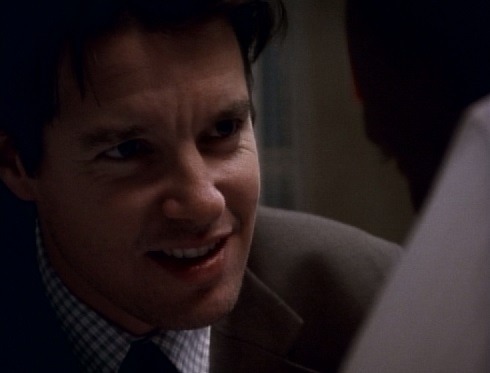
The idea of that unscrutinised blind spot is reinforced throughout the rest of the series so far; while none of the other central male characters have reacted quite as wildly as Bayliss, they do form a cohesive track record for refusing to do their own emotional labour in working their way through romantic disappointments. Felton is a slightly different case since his relationship woes are also tied up with custody of his children, and as such his spiralling alcoholism is not necessarily a consequence of the end of his marriage itself so much as it is about the messy way that plays out (it is very, very messy, though, and he does lean on the other women in his life throughout rather than taking control of his situation himself). Bolander was a total bear throughout the first season after separating from his wife, and Munch I already flagged in my previous review for his attitude toward his now-ex Felicia throughout the final ups and downs of that relationship. Lewis may just drag himself off to eat some cous cous all alone, but he still wallows over a relationship that never even began; Gee does the same thing after being rejected by Russert’s friend Amanda (though there is an additional factor there in which Gee - this guy:

- feels that Amanda - this lady:

- has rejected him because he’s blacker than she is, sparking what remains the only discussion on colourism within the black community that I have ever seen on tv. It’s an illuminating subject that deserves discussion, though we never find out if it really is the reason for Amanda’s rejection or if she was just not interested in Gee for any number of other, completely legitimate reasons). As Bayliss forgoes all self control, as Felton spins his ridiculous opinions on health food, and as Bolander commiserates with Gee about how ‘the way a woman feels about a man, that’s the way he’s going to feel about himself’, there’s a consistent theme of this notion that women have a responsibility to prop men up and protect their fragile egos, and it’s a theme that the show - for all that it is mostly very self-aware - doesn’t seem to challenge at all.
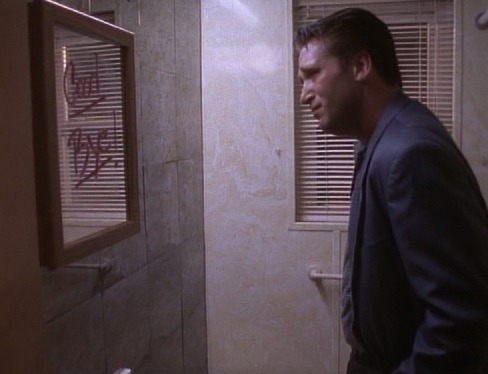
While I’m griping, there are more imperfections this season than there were last time around: Munch makes a lot of jokes about women, not necessarily in disparaging ways but definitely in an othering fashion which lends itself to a perception of women as objects of desire rather than, um, people. His nihilistic attitude about pretty much everything combined with his regular gendered commentary can make him pretty hard to enjoy as comic relief, especially when you’re viewing the show with a deliberately critical eye (he also makes a joke about prison rape at one point, and rape jokes of any kind are a surefire way to vault straight into my bad books). Pembleton gets embroiled in a political quagmire involving one Congressman Wade: a closeted homosexual, Wade has filed a false police report to try and cover up his affair with his male assistant, fearing that said assistant might expose him by filing assault charges after Wade beat him up. While everyone involved rightfully agrees that being gay should not end Wade’s political career, they all kinda ignore the fact that committing assault probably should, and I’m not ok with the way that detail gets shrugged off. And the episode ‘The Last of the Watermen’ not only uses the cliche of having a character just-happen to catch a case while on vacation, it also repeats the cliche of having a former flame of Howard’s as a suspect, something we already did in season two (less than ten episodes ago, to make it even more egregious that we’re doing it again); the show is better than that kind of contrivance.
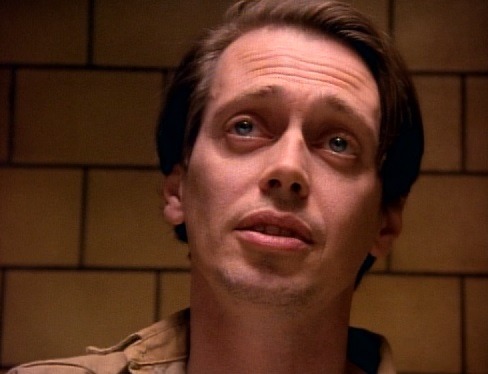
To wrap this on a good note though, there were also some real gems in the piece: the episode ‘Colors’ delivers a great guest star in David Morse and tells a confronting story about the insidiousness of subconscious racism; it’s very easy for shows to do stories about racism that acknowledge it in a very obvious surface-level way (i.e. this person treats that person badly because of the colour of their skin, and that’s wrong), but it’s more difficult and more important to explore the subtleties of the ways racism can manifest both individually and systemically, and that’s what this show does so well. On the topic of great guest stars, Steve Buscemi is used to magnificent effect in ‘End Game’ as a character who is so very, very wrong in such very, very obvious ways, and yet so superciliously convinced of his correctness that he’s impossible to argue with (we all know at least one person exactly like that). Buscemi’s turn comes at the culmination of the three-episode arc surrounding the shooting of three of our detectives, which is masterfully handled both in the immediate shock and the ensuing tension, as well as in the complicated miasma of emotional fallout for the rest of the squad as they struggle and rally. The fallout from that arc continues to permeate the rest of the season, in much the same way as the suicide of our beloved Steve Crosetti does at the beginning of the season: the episode ‘Crosetti’ is the highlight of the season despite fierce competition, and watching Lewis bawl his eyes out while Bolander holds him still gets me every time, but it’s nothing compared to watching Pembleton provide a one-man Honour Guard for his fallen comrade at episode’s end. The heaviness of the episode has some serious emotional staying power, and while the ditching of Crosetti was another network-mandated dick move designed to up the show’s sex appeal, the writers well and truly made lemonade by crafting the loss into a powerful narrative which emphasises and reinforces the core of the series itself: the horror and the battle to overcome the darkness of a truly thankless job, and find the good glimmer of life that lies beyond it.
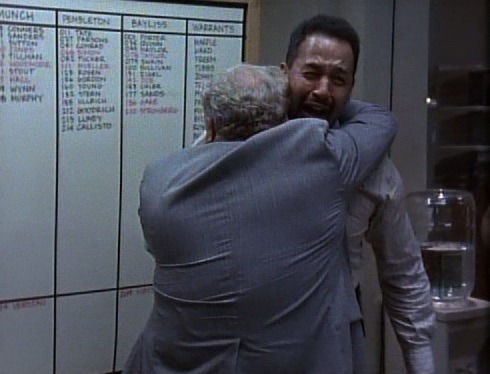
#Homicide: Life on the Street#Homicide: Life on the Street season three#HLOTS#Bechdel Test#full season review#female representation
13 notes
·
View notes
Photo
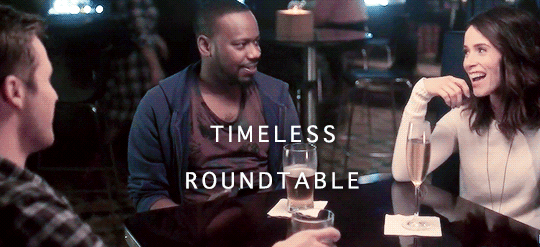
Welcome to EverythingTimeless’ Weekly Roundtable, a sprawling discussion in which your friendly neighborhood Mod Time Team breaks down episodes of our favorite show, Timeless. We can’t promise to be coherent, but we’ll try our best. Lovely header gif courtesy of our pal @lady-demelza.
This week: Season 1, Episode 1 - Pilot
Sarah: I think that we should first state that we are currently blogging this from what we consider the present: Wednesday, the 11th of July.
Ann: I hate to break it to you, Sarah. But it is actually the 12th of July.
Sarah: Well, I am in the past. Apparently. Changing it.
Ann: *Lucy screams in the distance*
Sarah: Can we call ourselves The Time Team? Time Team Part II?
Gissane: I like The Time Team Part II!
Ann: So I am actually just now rewatching the pilot (because if there is anything I excel at it's procrastination) and I still die over 2 things right off the bat: the cinematography of this show and MA'AM.
Sarah: That scene? With Lucy, Wyatt, and Kate silhouetted by the fire? Gorgeous.
Gissane: Agreed. It's STUNNING. And good grief, ma'am. Ma'am is everything.
Ann: Omg, for a minute I thought you were talking about /our/ Kate and I was VERY confused.
Kate: Ma'am forever and always. The little battles that Lucy and Wyatt have in that first episode create some great tension.
Ann: I swear she is a little happy when he gets time travel sick. And I appreciate that level of petty.
Sarah: Oh, definitely Ann. In retaliation for that self-satisfied look when she couldn't handle all of the seat belts. Surely.
Kate: He gets that same look when he tells he he needs her very modern bra.
Sarah: Perhaps we should start from the very beginning? I'm told it's the very best place to start.
Ann: The very best.
Kate: Maria Von Trapp was a wise woman.
Sarah: Lucy: First impressions.
Kate: Besides her phenomenal hair game? This woman is incredibly intelligent, but even better, she is witty. But Lucy in that classroom? All confident and full of facts. Leading lady swoon.
Sarah: Leading Lady Swoon™
Gissane: I loved Lucy's excitement! She puts so much heart into everything she does, and she is flat out perfect.
Ann: My first impression of Lucy was OH BUT I LIKE HER. She's a nerd through and through, in that she is hella passionate about history and is basically just Jazzed Beyond Belief about it all.
Sarah: I could definitely do with more of Professor Preston.
Kate: And having trouble with the establishment bros getting tenure? I was indignant on her behalf. But it leads nicely into her struggle to start her own legacy or fulfill her mother's. Which I think if you juxtapose with the last episode makes you go DAYUM.
Gissane: Amen to that, Kate!
Sarah: Definitely, Kate. But is also makes her intelligence and success working as part of the Time Team more satisfying. She's the fricking best.
Kate: She really is.
Gissane: Lucy was so easy to love from the moment she was on screen. Maybe it's because Abigail Spencer is a brilliant gorgeous unicorn, but she just had so much personality.
Ann: It's funny rewatching this after so long, and after being such a fan of everything about it, how different they all were at the beginning. It's like as much as I loved Lucy from the get-go, I did NOT like Wyatt.
Kate: So true. They became such a cohesive and indivisible unit i was hard to go back and see them before.
Sarah: Amen, Ann.
Ann: He was brash, kinda ruthless, and a little unhinged, to be honest.
Sarah: I thought Wyatt was boooorrring.
Ann: The dimples happily remain unchanged, however.
Kate: And besides the ma'am that stopped my heart, I was so very worried that Wyatt was going to be Vanilla Male Lead #950643
Sarah: Yes, Kate. Yes. I was like - Oh. Pretty and Generic.
Gissane: You know what I just realized, we never get a scene of what Wyatt's doing before he gets called in. We have Lucy's life and Rufus', but Wyatt nothing and now I'm very intrigued. Are we even told where he was? My memory is blanking on this.
Sarah: No! You are so right, Goose.
Sarah: We start in medias res on Wyatt.
Kate: I think Wyatt is meant to be the mystery as he is the military man. Shrouded in secret missions and all that.
Sarah: I think it also keeps him as Generic Military Pretty Boy.
Ann: I really expected him to be a cardboard cutout of the media's interpretation of a Super Soldier. As well, this episode did a really good job painting him as such. I was so happy to be surprised later on.
Gissane: And I agree. I didn't have any thoughts on him particularly rather that I didn't care. But then he mentioned his wife's death and I was like oh? Tell me more. Tell me more about the mysteries behind those blue eyes. Please and thank you.
Ann: I am at that scene right now. The whole jail scene with him and Lucy really deepened my interest in all of the characters.
Kate: And Rufus. Rufus is never not just everything and more.
Ann: E V E R Y T H I N G.
Sarah: I think that's one of the aspects of this show that really hooked me: It took character archetypes I thought I knew, and made them real, likable, and interesting.
Gissane: That entire scene in the jail is perfection. I get chills every time I think of Rufus' speech to the guard. Brilliant. EPIC.
Sarah: Fun fact: Malcolm Barrett improvised most of that speech!
Ann: He did?? I didn't know that!
Kate: That scene is even more profound now.
Gissane: That's when Rufus went from aww, what a sweetheart to OH MY GOD, YOU ARE EVERYTHING TO ME.
Sarah: Yeah! Kripke and Ryan talked about it at the screening I went to. He also improvised the "the back of the bus was great" line.
Kate: What this show does with Rufus, giving him this complex, meaty character and actually allowing for discussions of race through history is one of my favorite parts of the show.
Sarah: Yes, Kate.
Gissane: All the awards because that scene was the episode's best -- context and performance wise.
Ann: Hard agree, Kate. And they did it right from the start and kept it up the whole damn season.
Sarah: The moment Rufus says to Mason that it has never been a good time to be a black person in history was when I knew this show was self-aware. You can have fun, you can have irreverence, you can have a family show and still address very real, very important, very serious issues.
Kate: It's a perspective that demands to be told. I could not be happier they were brave enough to.
Sarah: And by Malcolm Barrett, who is the most perfect cinnamon roll as Rufus.
Gissane: This show's self-awareness is what makes it so unique. Time travel? Cool, it's been done a couple of times. But to actually highlight the negativity in history makes it much more unique and intriguing.
Ann: Another thing the show does well? Guest characters you care about. These random, one-off historical people...somehow relevant and fleshed out in 45 minutes every week.
Kate: I could write sonnets about Timeless and their guest characters. Maybe I have and they are hidden in my sock drawer... you don't know.
Sarah: Kate Drummond appears. Could be some sort of Male Brand Strong Female. But is somehow so careful and wonderful
(EDITOR’S NOTE: Delve into the kickass history of the amazing female journalists who could have served as inspiration for the fictional Kate Drummond with this week’s Historical Hour with Hilary, our resident historian!)
Kate: She is ballsy and capable. I love her.
Sarah: Both Lucy and Wyatt's interactions with her.
Ann: Exactly! Kate Drummond was brilliant. Also kickass red lipstick, which is bonus.
Sarah: Are meaningful and lovely.
Gissane: And so dedicated to her work. No distractions. I loved that!
Kate: And I think it is important they chose her, a character she who was fated to die. Because they make us love her and it makes the implications and the desire to change history to save her real for us. Just as it is real for the Time Team.
Sarah: Right, Kate. Contextualizing what it means to change - or not change - history. Kate is someone Lucy admired and had to watch die. Kate is someone Wyatt identified with immediately on a very intimate level - and had to watch die.
Ann: It's so powerful.
Sarah: Wyatt, as we see briefly here, is obsessed with saving his wife because he feels responsible. But in the very first episode, we see him save someone from their "fate" - only to see that effort thwarted minutes later.
Ann: OH A WILD GARCIA APPEARS. Quite literally wild. But also dayuuum.
Sarah: AND WHAT A FINE SPECIMEN HE IS. I will never not love Goran Višnjić.
Gissane: WHAT A COMPLEX SPECIMEN. And now he is someone I literally couldn't for the life of me imagine caring about and yet, here we are.
Kate: I could stare at those broody eyes, flippy hair, and angular cheekbones all the days.
Sarah: He could have chemistry with a piece of anthracite.
Kate: Yes, Goose. I knew the second he was supposed to be our "villain" we were in for a much more layered portrayal of a man with much more to show us.
Ann: That's the brilliance of well-written character-driven stories. I demand more.
Kate: We all did, so much so they were forced to renew it. Hahaha But I digress.
Ann: You also speak the sterling truth. (CONGRATS CLOCKBLOCKERS.)
Kate: (PAT YO SELVES ON THE BACKS, SIRS AND MADAMS)
Gissane: Can I just mention how much I love that fandom name?
Kate: You most certainly can, and I will heartily second it.
Ann: Also can we talk about the supporting cast for a quick second? A Denise Christopher or a Jiya Marri perhaps? Because again with the fleshed out, interesting REAL secondary characters.
Gissane: YES. And right from the start they're both such a presence on screen. You instantly want to know more.
Kate: I love Denise and her no nonsense attitude. I need to you save time guys. You will do it. I will need you again. You will do it. Wonderful, thanks, bye.
Ann: Ha ha ha, exactly!
Kate: And smart, capable Jiya! Rufus was making heart eyes at her in the very first scene and I both understand that on a spiritual level and am here for it.
Ann: Again though, another example of characters I expected them to just leave as cardboard cutouts. But nope. Not Timeless. No simple Hard Liner Bosses or Nerdy Tech Girls here. We get warm, lovely, interesting people.
Sarah: And then he asked her out like a normal person instead of weirdly objectifying her. And then she said yes like a person instead of being some strange Unattainable Manic Pixie Dream Girl.
Gissane: Shout it from the rooftops, y'all. From the rooftops!
Sarah: Yes - Annie. We actually get people!
Kate: And these people are women! How often does that happen?!
Ann: This and Wonder Woman? *laughs to keep from crying*
Kate: And women of color, no less. Be still my heart.
Sarah: I think one thing that really struck me upon rewatch was what a STRONG pilot this is. I always give myself the 3 Episode Rule.
Ann: Yes Sarah! I was just thinking that as it concluded. I immediately want to watch 15 more.
Sarah: Which is: Watch 3 episodes of a show before deciding it it's worth a watch. There wasn't huge amounts of obvious exposition. The plot was not throw-away.
Kate: It really had everything I was looking for.
Sarah: We were invested in the characters. And, as a person who is very picky about time travel, it handled that aspect so well.
Ann: I think, aside from Back to the Future, it's one of the only pieces of media that has handled time travel in a way I enjoy. Because OBVIOUSLY Back to the Future.
Kate: You can always tell when writers care about their characters because they give you no choice but to also. And they managed that with all of them which is no easy feat.
Gissane: See I liked the pilot. I didn't LOVE it. Until like the second rewatch after I'd already been invested, but it was just right to keep me wanting more. And then episode two happened. I have never looked back after that.
Ann: Oh man, episode 2. I think that is still my favorite episode.
Kate: I am not emotionally prepared to discuss episode 2. Lock it up, you two.
Ann: Gah, ok. You're right. That's for next week.
Sarah: So if we're going to sum up our feelings on rewatch:
Lady Swoon™
Wild Garcia Yes
Rufus FTW
Ann:
No One Likes Wyatt Yet
Kate:
(except Kate for shallow reasons only)
Sarah: Because that hat. Always the 40s fedora on classy, attractive gentlemen.
Gissane: He should always wear hats.
Kate: Ah yup. I mean all the Timeless men are yummy. I just want them all in various period hats for my viewing pleasure and I am not sorry.
Ann: And you shouldn't be.
Sarah: Never apologize.
Kate: The ladies, too. We are blessed.
Sarah: Any final thoughts on the first episode before we bring this Lifeboat back to dock?
Gissane: It's a damn good pilot when you think of it. So rich and full. And so very promising. I've converted about five of my friends into fans already. I'm stupidly proud of this.
Ann: I've got a question: What time period would you you guys travel to?
Gissane: One cannot simply choose. Nope. Don't make it.
Kate: Time travel questions are hard because being a lady in history could truly suck.
Ann: Yes it could. And probably will?
Kate: But I am not going to pretend like I didn't read all the Jane Austen and wish I wasn't Elizabeth Bennett.
Gissane: S A M E.
Ann: Oh hell yes. Or watch Meet Me in St. Louis and want to wear one of those outfits Judy Garland sports and sing on trolleys?
Sarah: Don't want to go all Owen Wilson on y'all, but send me back to that Lost Generation in Paris 1920s.
Ann: Only if I can drink with Hemingway.
Kate: Obvi.
Sarah: So long as you are Brave and Strong, Annie.
Kate: Can we just quickly pour one out for poor Amy?
Gissane: I wasn't prepared for that one, Kate. BRING AMY BACK.
Kate: Timeless and their twists man. MY HEART STRINGS CAN ONLY TAKE SO MUCH.
Sarah: *frantically makes buttons and posters* BRING BACK AMY. SAVE AMY 20K17.
Gissane: Seriously. MAKE ALL THE POSTERS.
Kate: They rip her away from us and Lucy and right before the episode with Robert Todd Lincoln. It is too much. I need to rest.
Sarah: May Robert Todd all carry us softly to sleep. Thanks for the great chat, ladies. Cannot wait to really unpack and dig in.
Gissane: Cheers to that. Til next week!
Kate: Agreed. Until next time!
Ann: See you IN THE FUTURE! #godiamsolame
41 notes
·
View notes
Photo

Karnak #6 Review
spoilers spoilers spoilers spoilers spoilers spoilers spoilers spoilers spoilers
The Flaw of All Things comes to its existential conclusion, by the creative team of Warren Ellis, Roland Boschi and Dan Brown. Full recap and review following the jump.
Acted on the behest of the secret spy organization, Shield, Karnak has ventured out to track down a young new Inhuman named Adam Roderick who has been abducted by a shadowy terrorist organization. In his pursuit of Adam, Karnak discovered that the young Inhuman had manifested incredible reality-warping powers. Adam had made himself into a god, his former abductors becoming his loyal acolytes. Adam’s powers enable him to grant onto his followers everything they wanted, a sense of purpose and utter contentment. Yet Karnak knew that all that Adam created was illusion; the reality that Adam crafted was artificial and inauthentic, his followers were made cattle stripped of their humanity. To this extent, Karnak has deemed Adam an effrontery to the fabric of truth; and he has pledged himself to destroy Adam and put an end to this existential threat.
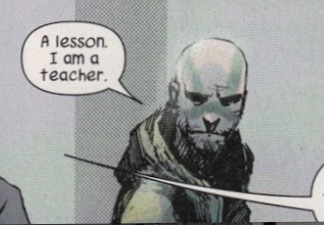
In the previous issue, Karnak had interrogated one of Adam’s acolytes, a powerful being known as The Painter. In this interrogation, The Painter was able to hone in on Karnak’s insecurities, highlighting that the false sense of meaning provided by Adam is truly no better nor worse than the abject nihilism entailed in Karnak’s philosophy. Karnak didn’t take kindly to this challenge and slammed his fist down with such precise magnitude that it caused the Painter’s body to explode in a gory torrent. Karnak claimed that the acolyte was a human improvised explosive device, but Shield sub-director, Coulson, remained unconvinced. Indeed it was becoming clear to Coulson that this mission has caused Karnak to become increasingly unhinged.

Karnak explains to Coulson what makes Adam such a threat. Adam can see what people want and need and give it to them; and in so doing taking from them of something essential, making them less than human, turing them into monstrous slaves. Coulson asks what it is that leaves Karnak immune to Adam’s powers and the reply is that it is his own selflessness and want for nothing that protects him.

Coulson’s agents have identified Adam’s whereabouts, retrofitting a teleportation device to send Karnak to him. Karnak arrives at a darkened cavern and is immediately attacked by a host of giant monstrous spiders. These spiders are the remnants of Adam’s followers, transformed into mindless creatures.
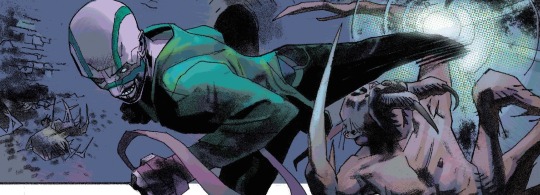
Karnak makes short work of these spiders, destroying them with a series of fault-finding kung fu chops and kicks. Karnak then ventures further into the cavern, eventually finding Adam sitting alone in large room.

Rather than fighting, Adam merely asked Karnak why he should take such exception to what he has done, why is it a bad thing? He offers people purpose and contentment, the solace of meaning. What is wrong with that? Karnak notes that these dutiful followers have been transformed into spiders, yet Adam retorts that the life of a spider is actually quite rewarding and structured. He has made them simple and this simplicity has taken away their pain.
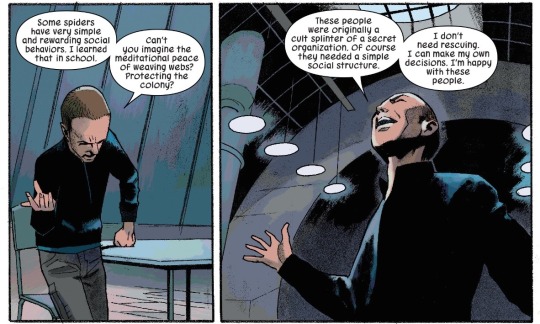
Karnak’s objection that it is all antithetical of truth. He states that he helps people become free by accepting the absolute truth that they are nothing, they are meaningless. It is harsh and it is painful, but it is the truth and is ultimately liberating. To be a happy prisoner or be painfully free, these are the two poles from which Karnak and Adam argue.

In the midst of their discussion, Adam probes Karnak, seeking out his own flaw, determining how he can give Karnak what he wants and hence make him a slave. Karnak may claim he has no wants, but of course this isn’t true. Adam can see into Karnak’s mind and he can see that Karnak is not as egoless as he says and indeed possesses deeply seated feelings of anger and inadequacy. His being denied Terrigenesis as a child appears to be at the root of his anguish.
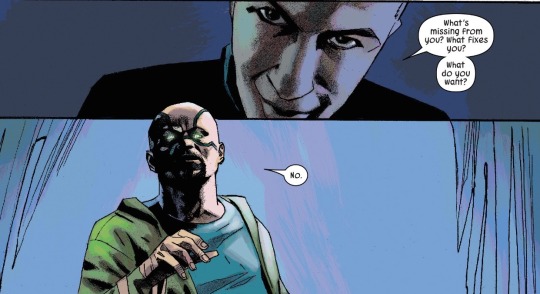
Honing in on this pain and weakness, Adam offers to fix him, make him feel whole. He will give Karnak what he wants and make him like him, cherish him as a god and become his slave. Boschi and Browns art really cut loose in this scene, offering an haunting image of what it might be like to accept Adam’s godhood...

Karnak is clearly shaken, but retains his wits in time to dodge Adam’s enchantment. Adam’s probing of Karnak has gone both ways and now Karnak is also able to ascertain Adam’s weakness, the flaw in his godlike powers. He swings with a keenly placed jab, striking Adam in the temple and destroying the area of Adam’s neurological structure that control and enables his powers.

A second blow renders Adam a near vegetable, effectively resetting his neurological functioning to that of an infant.

The narrative leaps forward to Karnak returning Adam to his parents’ care, promising them that Adam will be able to rehabilitate (it’s anyone’s guess whether or not Karnak is telling them the truth). In return, Karnak asks for his payment. This harkens back to the first issue in which Karnak agrees to rescue Mr. and Mrs. Roderick’s son in exchange for a simple request: that they offer to him the singular that enables them to see the world as a kind and meaningful place.
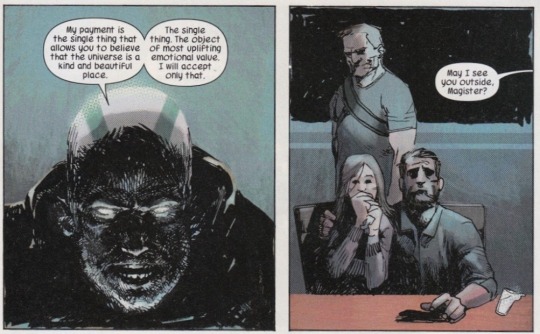
Mr. Roderick had thought the matter over and hands to Karnak a photograph of his family. It’s a picture that was taken on a day in which they told their son that anything was possible, that he is loved unconditionally and could be whatever he wanted to be. He gives this photograph to Karnak as a gesture of letting go of that kind, gentle sentiment.

Karnak receives his payment with cold detachment and makes his leave.
A final scene shows Karnak kneeling before the great stone in his Tower of Wisdom. He has placed the photograph of Adam’s family at the foot of the stone. Alone and unseen, Karnak allows himself to give into his sorrow and covers his face. And it is here that the series ends.
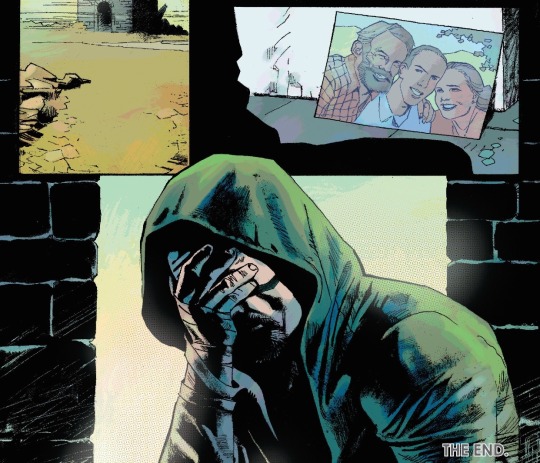
In announcing the completion of the final script for his Karnak tale, writer Warren Ellis dryly referred to the whole matter as “just bad readings of philosophy, punching, and a character study of an absolute trashfire of a human being. But I like to think it was worth it.”
Well, it has been certainly worth it, there has been a lot of punching and Karnak himself is indeed something of a trash-fire… I agree with it all except for the ‘bad readings in philosophy.’
I’m by no stretch an expert on the works of Nietzsche, or Kierkegaard, Baudrillard nor Sjöstedt-H. Yet I know the material well enough understand Ellis was not merely name-dropping the theories for the purposes of a pretentious backdrop for violent action. Ellis uses the theories but doesn’t resort to longwinded exposition or esoteric references; it’s not pedantic. It’s accessible, straight forward and unapologetically weird.

Karnak and Adam’s battle is essentially a question: is it better to believe in a higher power and in so doing become trapped and blinded, be rendered as sheep (or in this case spiders); or is it better to deny this higher power, to be free of it and embrace the harsh truth of meaninglessness? This question is posed, but an answer is not really given. Karnak talks like he knows what’s what, that he is without flaw. Yet it is made abundantly clear that he is quite flawed; that he is a sad and angry little man who is intent on enforcing his misery on everyone around him.

Adam was indeed a threat… his godlike powers could have rendered all mankind into mindlessly content followers. And Karnak is something of a threat as well. His strict adherence to nihilism is cruel and dogmatic. He and Adam are two sides of the same coin… I don’t want to buy what either of them are selling.
Karnak is by no means someone I would want to hang out with; I don’t agree with his philosophy and he’s a rather miserable bastard. And yet he is just hugely fun to read about. And the general tenner of this newer version of Karnak has been picked up by the other creators including Karnak in their tales. Both Al Ewing and Charles Soule have done terrific work in running with the version of Karnak Ellis and company have created. And it’s ended up making Karnak one of the most interesting and fun to read about characters in the entire Inhumans pantheon. I can’t wait to see what Mathew Rosenberg does with Karnak in the upcoming Secret Warriors series. The prospect of Karnak interacting with the likes of Kamala Khan and Lunella Lafayette fills me fearful excitement.
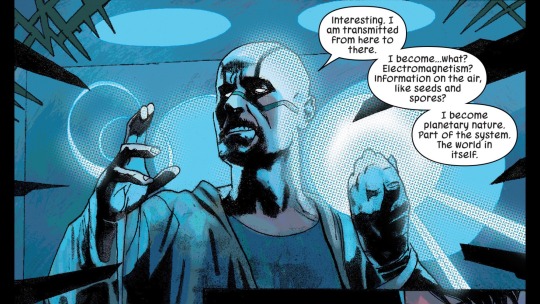
The whole series has been a bizarre, thought-provoking, thoroughly unsettling and tremendously fun read. It’s unequivocally recommended. Five out of Five Lockjaws.

14 notes
·
View notes